
What is a Private Yacht vs. Charter Yacht?
In the vastness of our blue planet, the realm of the ocean is a place of awe and mystery. And just as we've tried to understand the creatures that inhabit it, humanity has developed vessels to traverse its vastness. Among these, yachts have emerged as the epitome of opulence and intimacy with the seas. To truly appreciate the yacht's position in the maritime ecosystem, one must delve into the intricate differences between private and charter yachts.
In the vast tapestry of marine vessels, private yachts stand as a testament to personal luxury and bespoke design. They are not merely boats, but rather symbols of status, passion, and the desire for unparalleled freedom on the water.
Anatomy of a Private Yacht
Each private yacht is akin to a unique species in the animal kingdom, where every minute detail reflects the owner's preferences and dreams. From the sleek curves of the hull to the exquisite interiors, a private yacht is truly a habitat built to an owner's exacting specifications.
Many owners choose to keep these vessels as private sanctuaries, unseen and unknown to the general populace. They provide an escape, a connection to the ancient and vast rhythm of the ocean, away from the cacophony of daily life.
The Ethos Behind Private Ownership
Possessing a private yacht is not just about economic capability. It is about the deep-seated human desire to connect with the ocean, to tame it, and yet, to be humbled by its vastness. Much like a birdwatcher derives satisfaction from a rare sighting, a yacht owner rejoices in the solitude and tranquillity their vessel provides.
The Wonders of Charter Yachts
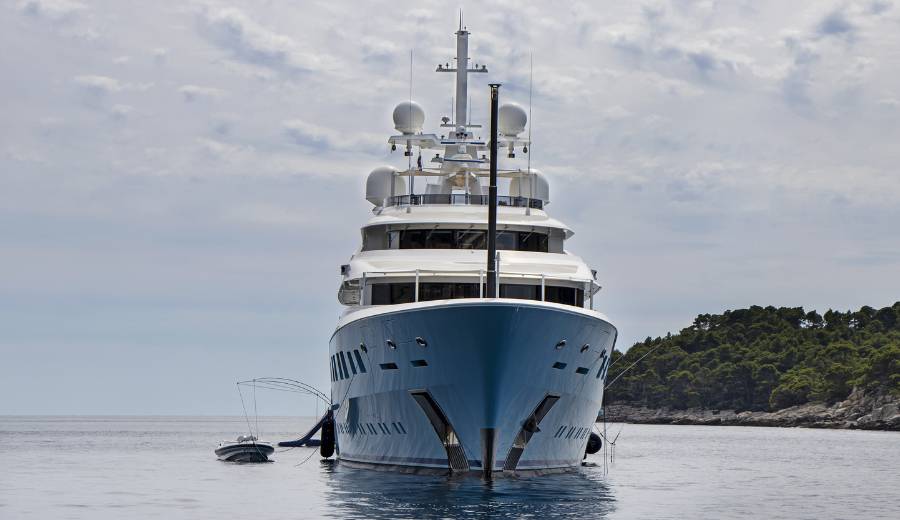
In contrast to their privately-owned counterparts, charter yachts embody a different, yet equally fascinating, approach to sea exploration. They represent the democratization of luxury, where the splendors of yachting are accessible to more than just the fortunate few.
The Composition of a Charter Yacht
Charter yachts are often built with a broader appeal in mind. Think of them as the migratory birds of the yacht world. They are designed to be adaptable, accommodating the needs and tastes of various guests throughout the seasons.
While they might not carry the extreme personal touch of a private yacht, charter vessels are by no means any less opulent. They are equipped with state-of-the-art facilities, luxurious amenities, and often come with a skilled crew adept at ensuring an unforgettable nautical experience for their guests.
The Philosophy of Chartering
Chartering allows individuals to dip their toes into the vast world of yachting without the long-term commitment of ownership. It offers a glimpse into the lavish lifestyle, a temporary sojourn into a realm where the horizon meets luxury.
Furthermore, chartering allows these magnificent vessels to be in constant rhythm with the sea, rather than being docked and dormant. It's a symbiotic relationship, where the boat thrives on its utilization and guests relish in its offerings.
Choosing between a private yacht and a charter yacht is akin to choosing between adopting a pet or visiting a wildlife sanctuary. Both offer profound experiences, yet they cater to different desires and commitments.
Those who yearn for a vessel that echoes their heartbeat, that serves as an extension of their identity, will naturally gravitate towards private yachts. It's about owning a slice of the ocean, a personal haven that can be visited at whim.
On the other hand, those who seek variety, who yearn to experience the myriad facets of yachting without the strings of ownership, will find solace in chartering. It's about tasting the many flavors the sea has to offer, one charter at a time.
Financial Implications: The Silent Current
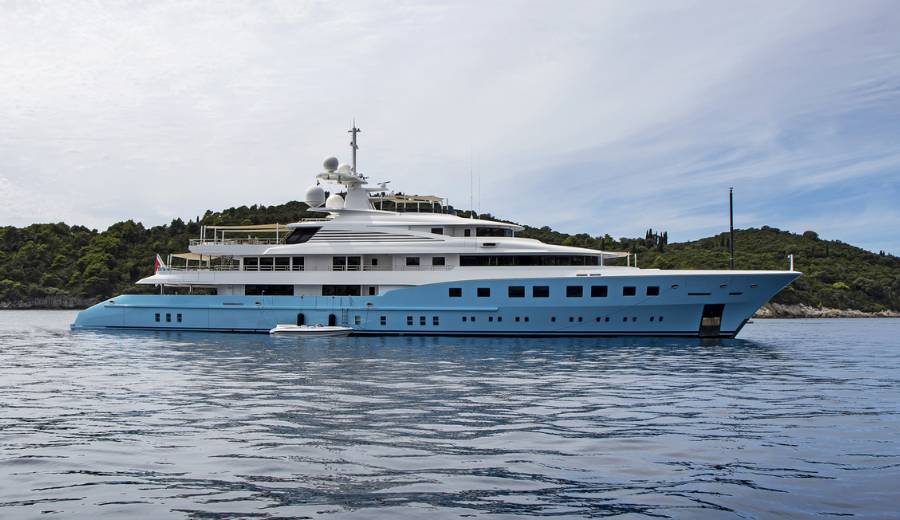
❑ Initial Costs and Maintenance
🚢 Private Yachts: The very act of purchasing a private yacht is a significant financial commitment. Beyond the purchase price, one has to consider annual maintenance, which often runs between 10% to 20% of the initial cost, docking fees, insurance, and crew salaries. It's not just buying a vessel; it's entering into a lifelong relationship.
🛥️ Charter Yachts: While chartering a yacht also demands a hefty sum, especially for the high-end vessels, it's a one-time expenditure without the long-term financial commitments. You get to experience luxury without the baggage of upkeep.
❑ Returns on Investment
🚢 Private Yachts: Some private yacht owners mitigate their maintenance costs by offering their vessels for charter when they're not using them. This can provide a steady stream of income, but it also means opening up one's personal space to outsiders.
🛥️ Charter Yachts: These are primarily business investments. Owners purchase these with the express intent of renting them out, often aiming for high occupancy rates to maximize returns.
Customization versus Versatility
🚢 Private Yachts: The beauty of a private yacht lies in its reflection of the owner's personality. From the color palette, interior design, and even the name, every aspect can be personalized. The yacht becomes a floating piece of art, a personal sanctuary on the waves.
🛥️ Charter Yachts: While they are opulent and luxurious, they often have a more neutral design to cater to the tastes of a broader range of people. Their versatility is their strength, aiming to please many rather than deeply resonate with one.
The Crew: Guardians of the Voyage
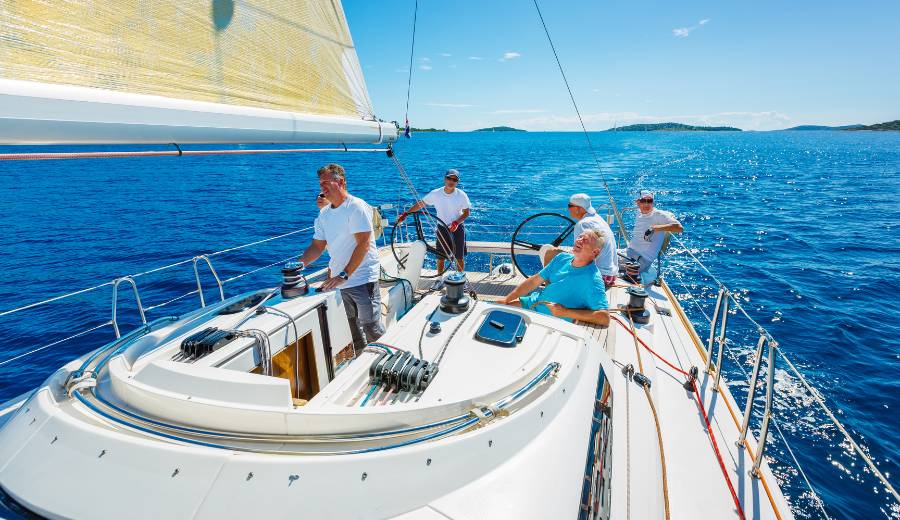
🚢 Private Yachts: Crews on private yachts often develop a deep bond with the owners. They understand the owner's preferences, habits, and desires. It's a dance of familiarity, where words are often unnecessary.
🛥️ Charter Yachts: The crew is well-trained to adapt quickly to the needs and wants of different guests. They master the art of impeccable service without the advantage of longstanding familiarity. Each trip is a new adventure, a fresh set of faces, and unique demands.
The Ecological Footprint: Treading Lightly
Both private and charter yachts have an ecological impact, from fuel consumption to waste management. However, there's a rising trend in the yachting world to adopt eco-friendly technologies and practices.
🚢 Private Yachts: Owners with a deep passion for the ocean often lead the way in adopting sustainable technologies, from hybrid engines to solar panels.
🛥️ Charter Yachts: Given they are often part of a larger business model, there's an emphasis on efficiency. Green charters are becoming increasingly popular, appealing to environmentally-conscious clientele.
Concluding the Voyage
The realms of private and charter yachts are but two spectacles in the grand theater of maritime luxury. Each offers a distinct journey, a unique story, and a personal relationship with the boundless ocean. Whichever path one chooses, the sea, with its eternal embrace, awaits with open arms.
Frequently Asked Questions
In our ceaseless journey through the maritime tapestry, we often find ourselves faced with questions - those curiosities and wonders that arise when contemplating the world of yachts. We have curated some of the most frequently pondered inquiries to further illuminate the intricate dance between private and charter yachts.
Why do people often opt for chartering instead of buying?
Chartering allows individuals to experience the luxury of yachting without the ongoing commitment of ownership. It's akin to wandering through various terrains on our planet, sampling each without settling in one. By chartering, one can traverse different waters, aboard varying vessels, without being tethered to the responsibilities of upkeep.
How does one ensure the crew's competence on a charter yacht?
The crews aboard charter yachts are often meticulously trained to cater to a broad spectrum of guests. They are seasoned sailors, well-versed in both the art of navigation and hospitality. We would always recommend seeking yachts managed by reputable charter companies, ensuring a crew that meets the highest standards of professionalism.
Are there destinations that are exclusive to either private or charter yachts?
While the vast oceans and ports are open to all, some exclusive marinas and docking spots might prioritize private yachts, given the long-standing relationships with owners. However, charter yachts, due to their often-broader network, might have access to a range of curated destinations, opening doors to unique experiences.
Can a private yacht be transformed into a charter yacht?
Absolutely. Many private yacht owners choose to offer their vessels for charter to mitigate maintenance costs and ensure the yacht isn't lying dormant. This transition requires adherence to certain regulations and standards, ensuring the vessel is fit for guests beyond the owner's circle.
What ecological measures are being adopted in the yachting world?
We are increasingly witnessing a conscious shift towards sustainable yachting. From hybrid propulsion systems to waste management protocols, both private and charter yachts are embracing practices to reduce their footprint. After all, our love affair with the sea comes with the responsibility to protect its vast wonders.
Is the experience onboard a private yacht vastly different from that on a charter yacht?
While the core essence of luxury, serenity, and connection with the ocean remains consistent, the nuances do vary. Aboard a private yacht, every corner whispers tales of its owner’s personality and desires. A charter yacht, conversely, offers a more versatile, yet equally opulent experience, designed to cater to a myriad of guests.
In our exploration of the yachting world, it is these questions that guide us, enlightening our understanding and deepening our appreciation for this magnificent dance with the sea. We hope this curation assists you in navigating the enchanting waters of yachting decisions.


Sign up newsletter
- First Name *
- Last Name *
- Country of residence * Country of residence * Afghanistan Aland Islands Albania Algeria American Samoa Andorra Angola Anguilla Antarctica Antigua and Barbuda Argentina Armenia Aruban Australia Austria Azerbaijan Bahamas Bahrain Bangladesh Barbados Belarus Belgium(Dutch) Belgium(French) Belize Benin Bermuda Bhutan Bolivia Bosnia and Herzegovina Botswana Bouvet Island Brazil British Indian Ocean Territory British Virgin Islands Brunei Bulgaria Burkina Faso Burundi Cambodia Cameroon Canada Cape Verde Cayman Islands Central African Republic Chad Chile China Christmas Island Cocos Islands Colombia Comoros Congo Cook Islands Costa Rica Cote dIvoire Croatia Cuba Cyprus Czech Republic Denmark Djibouti Dominica Dominican Republic Ecuador Egypt El Salvador Equatorial Guinea Eritrea Estonia Ethiopia Falkland Islands Faroe Islands Fiji Finland France French Guiana French Polynesia French Southern Territories Gabon Gambia Georgia Germany Ghana Gibraltar Greece Greenland Grenada Guadeloupe Guam Guatemala Guernsey Guinea GuineaBissau Guyana Haiti Heard Island And McDonald Islands Honduras Hong Kong Hungary Iceland India Indonesia Iran Iraq Ireland Israel Italy Jamaica Japan Jersey Jordan Kazakhstan Kenya Kiribati Kuwait Kyrgyzstan Laos Latvia Lebanon Lesotho Liberia Libya Liechtenstein Lithuania Luxembourg(French) Luxembourg(German) Macao Macedonia Madagascar Malawi Malaysia Maldives Mali Malta Marshall Islands Martinique Mauritania Mauritius Mayotte Mexico Micronesia Moldova Monaco Mongolia Montenegro Montserrat Morocco Mozambique Myanmar Namibia Nauru Nepal Netherlands Netherlands Antilles New Caledonia New Zealand Nicaragua Niger Nigeria Niue Norfolk Island North Korea Northern Ireland Northern Mariana Islands Norway Oman Pakistan Palau Palestine Panama Papua New Guinea Paraguay Peru Philippines Pitcairn Poland Portugal Puerto Rico Qatar Reunion Romania Russia Rwanda Saint Helena Saint Kitts And Nevis Saint Lucia Saint Pierre And Miquelon Saint Vincent And The Grenadines Samoa San Marino Sao Tome And Principe Saudi Arabia Senegal Serbia Serbia and Montenegro Seychelles Sierra Leone Singapore Slovakia Slovenia Solomon Islands Somalia South Africa South Georgia And The South Sandwich Islands South Korea Spain Sri Lanka Sudan Suriname Svalbard And Jan Mayen Swaziland Sweden Switzerland(French) Switzerland(German) Switzerland(Italian) Syria Taiwan Tajikistan Tanzania Thailand The Democratic Republic Of Congo Timor-Leste Togo Tokelau Tonga Trinidad and Tobago Tunisia Turkey Turkmenistan Turks And Caicos Islands Tuvalu Uganda Ukraine United Arab Emirates United Kingdom United States United States Minor Outlying Islands Uruguay Uzbekistan Vanuatu Vatican Venezuela Vietnam Virgin Islands Wallis And Futuna Western Sahara Yemen Zambia Zimbabwe Country of residence * Afghanistan Aland Islands Albania Algeria American Samoa Andorra Angola Anguilla Antarctica Antigua and Barbuda Argentina Armenia Aruban Australia Austria Azerbaijan Bahamas Bahrain Bangladesh Barbados Belarus Belgium(Dutch) Belgium(French) Belize Benin Bermuda Bhutan Bolivia Bosnia and Herzegovina Botswana Bouvet Island Brazil British Indian Ocean Territory British Virgin Islands Brunei Bulgaria Burkina Faso Burundi Cambodia Cameroon Canada Cape Verde Cayman Islands Central African Republic Chad Chile China Christmas Island Cocos Islands Colombia Comoros Congo Cook Islands Costa Rica Cote dIvoire Croatia Cuba Cyprus Czech Republic Denmark Djibouti Dominica Dominican Republic Ecuador Egypt El Salvador Equatorial Guinea Eritrea Estonia Ethiopia Falkland Islands Faroe Islands Fiji Finland France French Guiana French Polynesia French Southern Territories Gabon Gambia Georgia Germany Ghana Gibraltar Greece Greenland Grenada Guadeloupe Guam Guatemala Guernsey Guinea GuineaBissau Guyana Haiti Heard Island And McDonald Islands Honduras Hong Kong Hungary Iceland India Indonesia Iran Iraq Ireland Israel Italy Jamaica Japan Jersey Jordan Kazakhstan Kenya Kiribati Kuwait Kyrgyzstan Laos Latvia Lebanon Lesotho Liberia Libya Liechtenstein Lithuania Luxembourg(French) Luxembourg(German) Macao Macedonia Madagascar Malawi Malaysia Maldives Mali Malta Marshall Islands Martinique Mauritania Mauritius Mayotte Mexico Micronesia Moldova Monaco Mongolia Montenegro Montserrat Morocco Mozambique Myanmar Namibia Nauru Nepal Netherlands Netherlands Antilles New Caledonia New Zealand Nicaragua Niger Nigeria Niue Norfolk Island North Korea Northern Ireland Northern Mariana Islands Norway Oman Pakistan Palau Palestine Panama Papua New Guinea Paraguay Peru Philippines Pitcairn Poland Portugal Puerto Rico Qatar Reunion Romania Russia Rwanda Saint Helena Saint Kitts And Nevis Saint Lucia Saint Pierre And Miquelon Saint Vincent And The Grenadines Samoa San Marino Sao Tome And Principe Saudi Arabia Senegal Serbia Serbia and Montenegro Seychelles Sierra Leone Singapore Slovakia Slovenia Solomon Islands Somalia South Africa South Georgia And The South Sandwich Islands South Korea Spain Sri Lanka Sudan Suriname Svalbard And Jan Mayen Swaziland Sweden Switzerland(French) Switzerland(German) Switzerland(Italian) Syria Taiwan Tajikistan Tanzania Thailand The Democratic Republic Of Congo Timor-Leste Togo Tokelau Tonga Trinidad and Tobago Tunisia Turkey Turkmenistan Turks And Caicos Islands Tuvalu Uganda Ukraine United Arab Emirates United Kingdom United States United States Minor Outlying Islands Uruguay Uzbekistan Vanuatu Vatican Venezuela Vietnam Virgin Islands Wallis And Futuna Western Sahara Yemen Zambia Zimbabwe
- US State * US State * Alabama Alaska Arizona Arkansas California Colorado Connecticut Delaware Florida Georgia Hawaii Idaho Illinois Indiana Iowa Kansas Kentucky Louisiana Maine Maryland Massachusetts Michigan Minnesota Mississippi Missouri Montana Nebraska Nevada New Hampshire New Jersey New Mexico New York North Carolina North Dakota Ohio Oklahoma Oregon Pennsylvania Rhode Island South Carolina South Dakota Tennessee Texas Utah Vermont Virginia Washington West Virginia Wisconsin Wyoming US State * Alabama Alaska Arizona Arkansas California Colorado Connecticut Delaware Florida Georgia Hawaii Idaho Illinois Indiana Iowa Kansas Kentucky Louisiana Maine Maryland Massachusetts Michigan Minnesota Mississippi Missouri Montana Nebraska Nevada New Hampshire New Jersey New Mexico New York North Carolina North Dakota Ohio Oklahoma Oregon Pennsylvania Rhode Island South Carolina South Dakota Tennessee Texas Utah Vermont Virginia Washington West Virginia Wisconsin Wyoming
- France Regions * France Regions * Auvergne-Rhône-Alpes Bourgogne-Franche-Comté Brittany Centre-Val de Loire Corsica Grand Est Hauts-de-France Paris Region Normandie Nouvelle-Aquitaine Occitanie Pays de la Loire Provence Alpes Côte d’Azur Guadeloupe French Guiana Martinique Mayotte Réunion France Regions * Auvergne-Rhône-Alpes Bourgogne-Franche-Comté Brittany Centre-Val de Loire Corsica Grand Est Hauts-de-France Paris Region Normandie Nouvelle-Aquitaine Occitanie Pays de la Loire Provence Alpes Côte d’Azur Guadeloupe French Guiana Martinique Mayotte Réunion
- I would like to receive special offers and boat show invites from Dream Yacht Sales
- Consent * * I have read Privacy Policy and agree that my personal data will be processed * *
- Request Type
- Phone This field is for validation purposes and should be left unchanged.
Private or Charter Yacht Ownership – Which is right for you?
The carefree cruising lifestyle. Wind in your hair, friends on deck, and endless horizons ahead. Sailing, the sea, and yacht ownership have an appeal that’s undeniable, and if you’ve made it to this page, you’ve probably considered purchasing a yacht at some point. So, let’s look at the basics of two ownership options – private yacht purchase vs. placing a yacht into a charter management program. No single option is better than another. Each have their own advantages and disadvantages based on costs, boating experience, and what factors are most important to you. Let’s take a closer look at some of primary factors to consider that might just help move you a step closer to your yacht ownership dream.
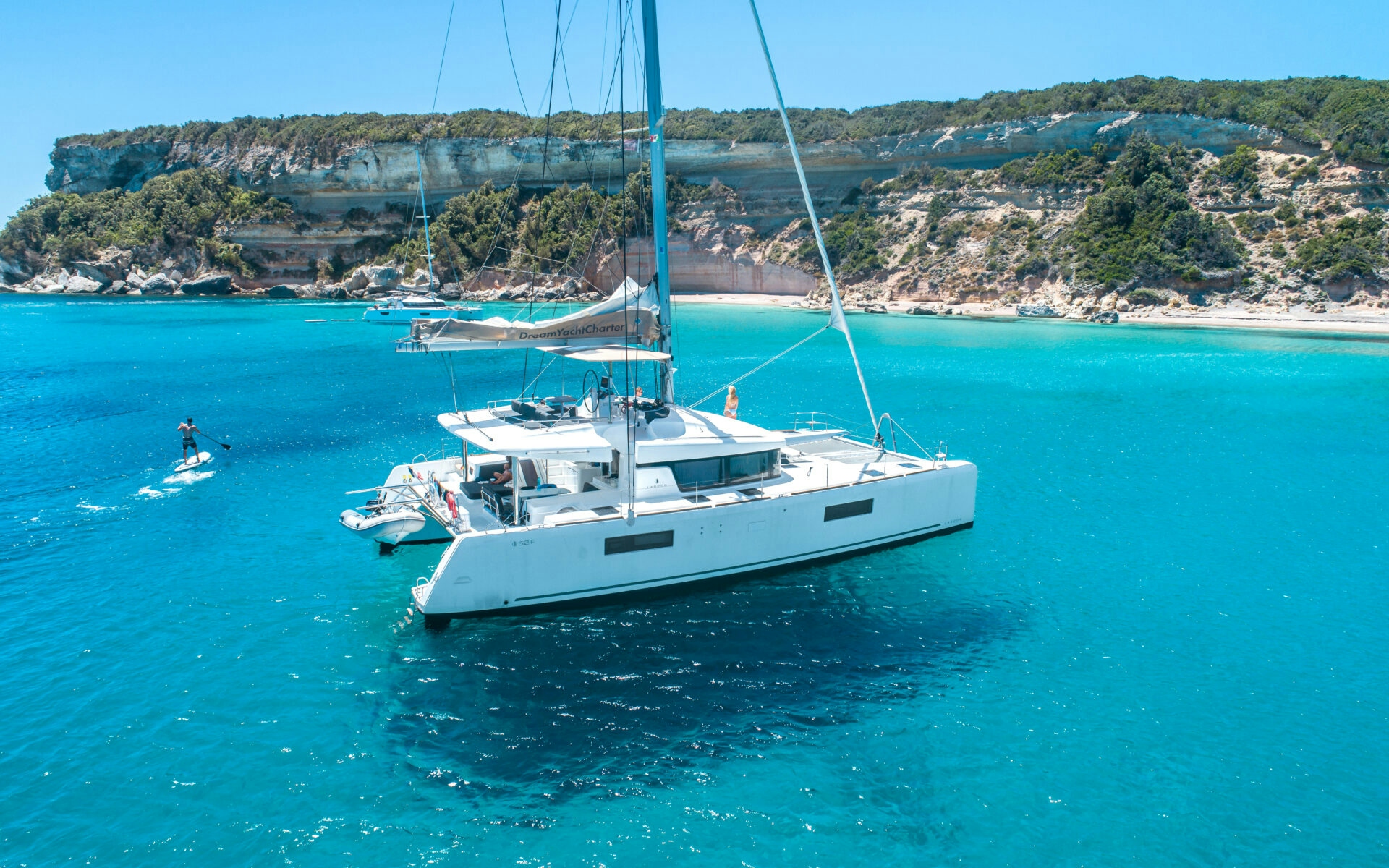
Travel dreams
Most of us can agree that we want to be out on the water sailing more often, but everyone has different ideas about where ! If you’re looking to cruise close to your home port, then perhaps a new or used private yacht purchase is the best for you, where you can keep your yacht close at hand for weekend sailing.
But if you’re like many of the Dream Yacht Charter owners that want to sail the world and discover new and exotic ports of call, then a charter program can be the perfect solution. With charter ownership, you can choose a program that allows access to sister ships around the world in your choice of 45+ idyllic destinations. You’ll simply fly to your chosen destination, step aboard and see the world – without the daunting yacht preparations, or long passages to get to your preferred cruising grounds eating into your precious vacation time. Whether you’re dreaming of cruising Croatia or Greece in the Mediterranean; the tropical Caribbean islands of Grenada, St. Martin, or Antigua; or exotic wonderlands such as Tahiti or the Seychelles, it’s all very possible when you place your new yacht in a charter management program!
Other cruising dreams often include setting off for longer term liveaboard cruising aboard your yacht – to explore the world at your own pace with no set schedule. If this is a long-range goal for you, an ownership program is a great way to set yourself up and help you prepare. A 5-year program is a nice buffer between when you purchase, and when you set sail on your liveaboard adventure – so you can plan for your future cruising lifestyle while you’re still receiving monthly charter payments and making progress in paying down any loans.
After the program is completed, you’re free to set sail for faraway places with the income, knowledge, and experience you’ve picked up during the program.
Sailing experience
How much experience is enough? Maybe you’re a sailor that hasn’t yet embarked on a sailing adventure beyond a nearby cruising grounds. Or maybe you have completed some training but haven’t used your skilled enough to feel entirely confident on the water. If you’re not yet comfortable with your sailing experience and wish to purchase a new yacht, there are a number of advantages to buying through a charter management program. Firstly, it’s a great way to own without the hassle and maintenance responsibility of private ownership. And with every charter week of sailing you’ll gain experience and confidence. Our base staff will welcome you, help you get familiarized with your yacht equipment, and provide a detailed chart briefing on your destination. And if anything should go wrong with equipment during your charter, Dream Yacht’s staff is available to assist.
All the while during your 5.5 years of ownership and sailing the world, you’ll gain confidence and skills beyond what can be learned from your local sailing school. At the end of your program when your yacht is phased out, you’ll be well-prepared to tackle more challenging cruising grounds, and exciting longer passages.
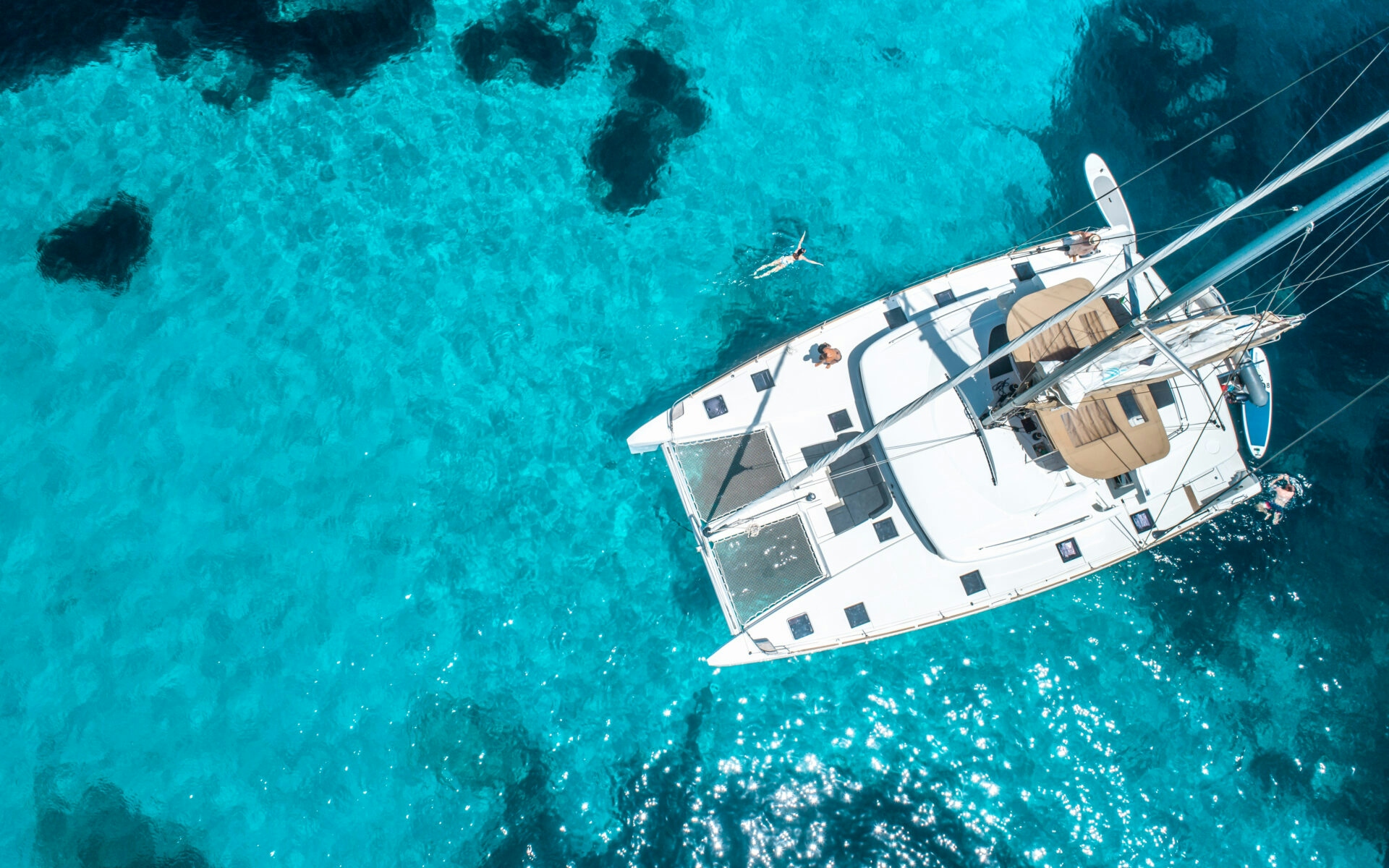
Yacht usage
How often will you want to use your yacht? Are you the kind of sailor that lives to spend every waking moment aboard your yacht regardless of its location? Or do you envision a few weeks of cruising perfection in paradise each year?
If your answer is every weekend, or more than 12 cruising weeks per year (or if you simply want to be the only one using your yacht), then a new or used private purchase would be a great choice for you.
Most of our charter programs allow for up to 12-weeks of owner use per year, and many owners find this more than enough time to enjoy sailing and exploring their favorite cruising grounds. To maximize your owner weeks, a flexible schedule helps to be able to take advantage of the 6 weeks of time that must be booked within 10 days of departure. Similarly, high season usage is limited, so flexibility on the time of year you sail helps you maximize you boat usage as well.
Maintenance & cleaning
Boats and maintenance go together, you can’t have one without the other – at least while still enjoying a good boating experience! Do you enjoy “tinkering” aboard a boat, looking after all the details to keep it in top condition, and doing minor repairs where needed? Keeping a regular maintenance schedule is a seemingly endless list of engine checks, fluid levels, battery checks, bottom cleaning and more. Private ownership involves the full responsibility for maintenance and repairs. Whether you hire it done or manage it yourself, it should not be underestimated.
One of the most beneficial aspects to charter ownership is having an expert team to look after a proper maintenance schedule, regular cleaning, and even repairs as needed. With every visit your yacht will be cleaned inside and out, with water and fuel tanks full and ready to leave the dock. Upon your return to the dock, the maintenance team will address any concerns you may have discovered while out on the water.

Cost considerations
We’ve saved this more obvious point for last, but cost considerations are likely one of the most important factors in your yacht ownership decision. What may not be quite as obvious is how quickly the costs can add up. Most people understand that purchasing a yacht for leisure comes with ongoing expenses far beyond the purchase price, but there are some costs that tend to be overlooked.
Our professional yacht consultants can help you better understand what costs to expect including: yacht insurance, dockage fees, maintenance, and cleaning. In short, traditional private yacht ownership is expensive, and while it does have a substantial upside, for many it’s not a realistic option
With a charter ownership program, you can purchase a new yacht and have the expenses of insurance, dockage, security, maintenance, and cleaning all covered for you. And what’s more – the regular monthly income from charter revenue helps offset your mortgage payments. For most people, it’s a much more affordable and worry-free way to own.
______________________________________
Whichever ownership option you decide is best for you, Dream Yacht Charter has you covered with flexible charter management programs and the widest choice of yachts for private or charter ownership.
Our expert yacht consultants can explain your options in depth and help you through the purchase process, from choosing a yacht that is right for you, to finding the best financing. Get in touch today !
Related Articles
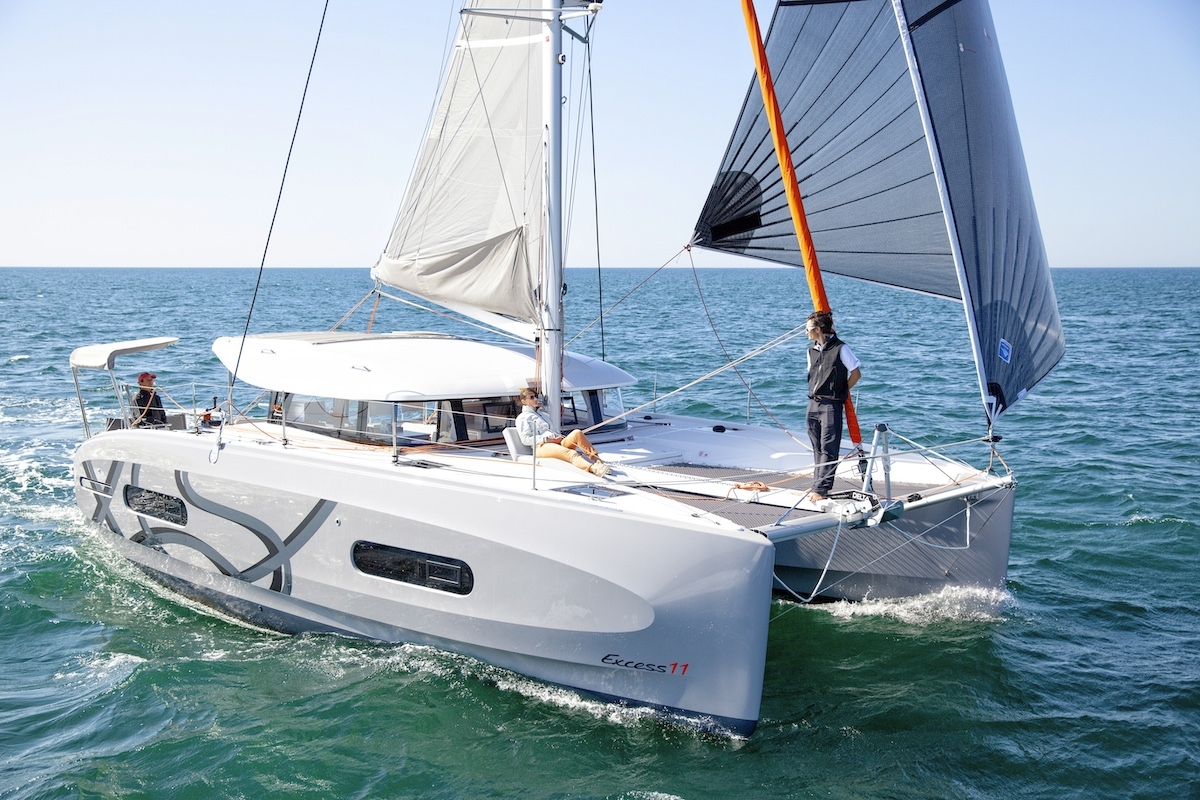
Buying an Excess 11 sailing catamaran: When less is definitely more
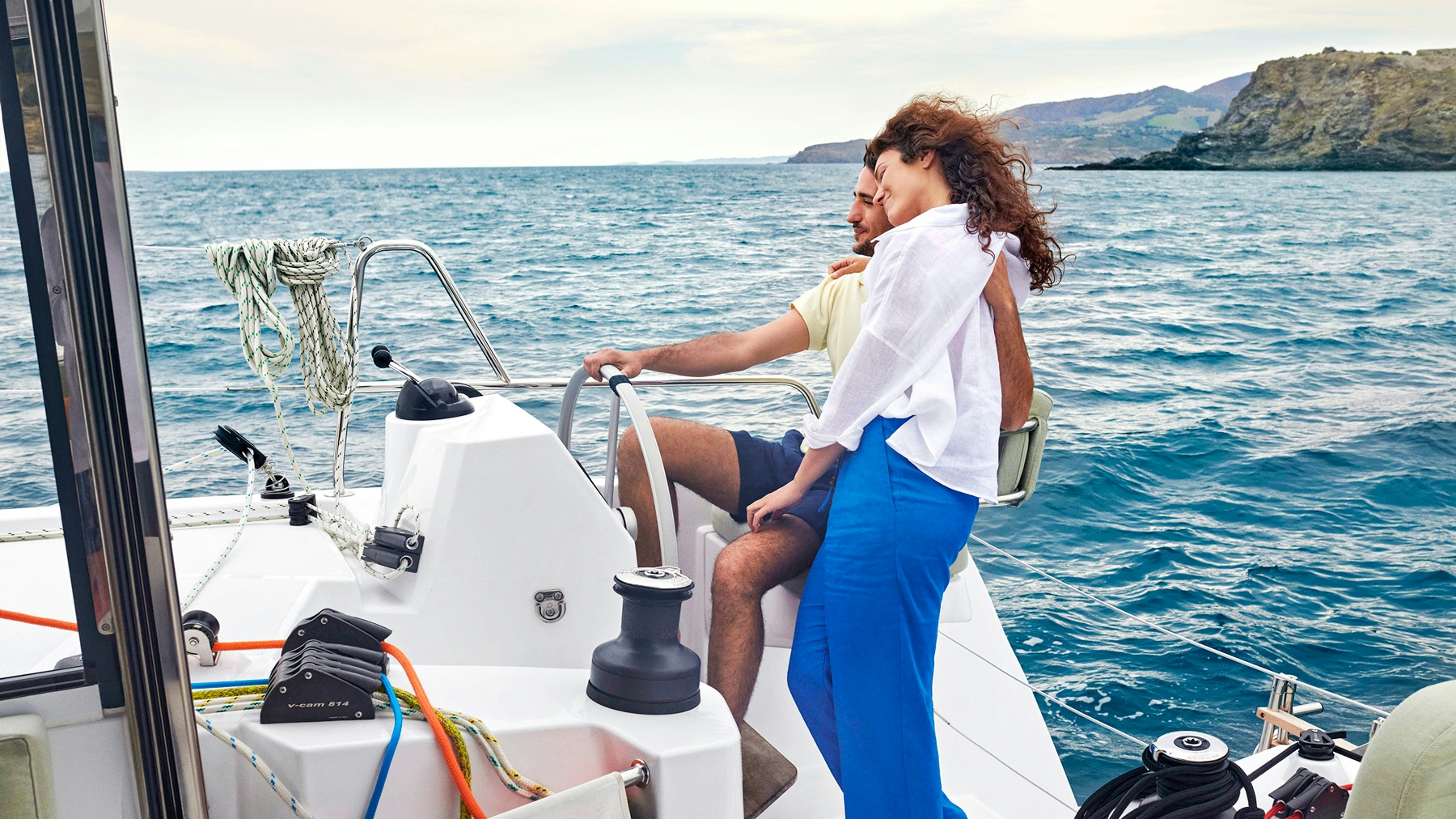
Bali Catsmart: smart, affordable & fun to sail
Crew Content
Essential Guides
Ocean Mapping
- Jan 21, 2021
A luxury yacht job offers a rewarding career and plenty of perks, whether you work on a private yacht or a charter yacht. However, there are some distinct differences to working as crew on these two types of vessels.
In a private yacht job, you will be working on a yacht used only by the owner and their guests. On a charter yacht, you'll be working on a boat that is chartered primarily by families for luxurious vacations, as well as by corporations for business use or special events.
Private yacht jobs and jobs on charter yachts both offer crew a different experience, from the way the yacht is run to their cruising programme. The type of vessel you work on can even impact your earning potential.
Before you start looking for a luxury yacht job, you should first determine what type of yacht is best suited for your skills and experience. Keep on reading to learn about some of the key differences between a private yacht job and working as crew on a charter yacht.
Private yacht job v charter yacht
Earning potential
While salaries are typically the same on private yachts and charter yachts, those working on a charter yacht can earn more as they will typically receive a gratuity at the end of each charter, which can be up to 20 percent of the charter price. However, some private yacht jobs can include generous end-of-year-bonuses or seasonal bonuses and may even offer benefits, such as health cover. It's also important to remember that tips are never guaranteed on a charter yacht.
You may have higher earning potential on a charter yacht, but you'll find this likely comes at the sacrifice of having less time-off to enjoy. Charter yachts are often booked solid through-out the popular yachting seasons, giving crew very little time off. A busy charter will find crew working round the clock. However, with a private yacht job, you may enjoy a less hectic schedule as the yacht will only be active when the owner chooses. This often means the crew spends more time at dock where they will typically work a standard 9-5 day maintaining the yacht.
Working as crew on both a charter yacht and private yacht offers the opportunity to travel the world. Typically charter yachts tend to be more limited in where they travel. They often cruise to popular yachting destinations for each season. For example, charter yachts are often based in the Caribbean for the winter and the Mediterranean in the summer. Private yachts go wherever the owner fancies, which means crew may have the opportunity to explore some of the world's remote and least visited destinations, anywhere from Antarctica to the Galapagos Islands, if the yacht's owner is adventurous.
One of the key benefits of a private yacht job is that you will get to know the yacht's owners (and any regular guests) likes and dislikes, enabling you to offer personal touches that ensure an exceptional level of service. Indeed, working on a private yacht enables crew to exceed expectations more easily, which can be immensely satisfying. Some crew will work for the same yacht owner for a significant period of time, developing a working relationship that can lead to a satisfying career. Of course, every private yacht owner is different and will place different demands on their crew. A charter yacht will have a regular roster of guests, meaning the yacht crew must think on their feet and anticipate their guests' needs. Every single trip is different on a charter yacht, so this type of vessel is an excellent option for those who want more spontaneity to their yachting career.
Whether a private yacht job or a charter yacht job is right for you comes down to personal preferences. While some like the non-stop action of a charter yacht and the chance to earn more, others prefer the greater predictability and less hectic schedule that comes from working on a private yacht. If you're searching for a yacht crew job, be it aboard a private yacht or a charter yacht, then contact a YPI CREW agent today.
Most read articles

Tips & Tricks
How many crew members are needed on a yacht?

How to Find A Caribbean Yacht Job

Yacht Job Offers
Open yacht crew jobs in March 2023

How to Become A Yacht Purser: Interview with Purser Trainer Angela Wallace

YACHT CREW GUIDES
IS YACHTING THE RIGHT CHOICE FOR ME?
Essential yacht guides

Mandatory certificates

What you need to know about B1/B2 visa

How to prepare for a yacht interview?
Read more latest news

- 9 hours ago
YPI CREW Will be Attending the Superyacht Technology Network Conference in Barcelona

Is a career in the yachting industry a good fit for me?

Webinar Friday, 15th March: How to Start Your Yachting Career as a Superyacht Stew?

Luxury Yacht Jobs: Private or Charter Yacht?
INDUSTRY NEWS

HOW TO WRITE A MEMORABLE YACHTING CV

YACHT CREW SALARY GUIDE
Error 404 — page not found, we’re sorry, we couldn’t find what you were looking for.
Please return to the YPI CREW homepage
Let’s get started. Call us on +33 (0)4 92 90 46 10 or email us.
Our mission, vision and values, mlc 2006 compliance, essential guides, yacht crew positions.
Chief Officer
Second Officer
Third Officer
Chief Engineer
Interior Crew
Head of Service
Head of Housekeeping
Specialist Positions
Spa Manager
Spa Therapist
Personal Trainer & Yoga Instructor
Hairdresser
Mandatory Certificates
B1/b2 visa information, how to write a memorable cv, how to prepare for an interview, yachting seasons, yacht crew salary guide, is yachting the right choice for me, cv templates, ocean mapping, crew content.
+33 (0)4 92 90 46 10
Private Yacht vs Yacht Charter: Which is Right for You?
Key takeaway:.
- Consider your individual needs and preferences: Private yacht ownership offers complete control and flexibility, while yacht chartering is a more convenient option for those who want to avoid the costs and commitments of ownership. Factors such as frequency of use, budget, and desired amenities should be thought about before making a decision.
- Be informed about the financial aspects: Private yacht ownership requires a significant investment of money and time. The costs and obligations associated with maintenance, mooring, and insurance should be considered. Yacht chartering may be cheaper upfront, but there are still hidden costs such as fuel, food, and crew gratuities.
- Understand the lifestyle and career implications: Working as a crew member on a private yacht offers a more intimate and personalized experience, while working on a charter yacht offers opportunities for travel and networking. Long-term career goals and desired lifestyle should be considered before deciding which option is right for you.
Private Yacht vs Yacht Charter: An Overview
When deciding between chartering a private yacht and hiring a crewed yacht, there are several factors that must be taken into account. In this overview, we’ll explore the main differences between these options and delve into the key considerations for each. From the amenities on board, including water sports equipment, tenders, spas, and exercise equipment , to the various factors that can impact your decision-making process, we’ll provide a comprehensive guide to help you make the right choice.
Factors to Consider When Choosing Between Yacht Types
Comprehending the aspects to consider when picking between various yacht types is vital for gaining a pleasurable boating experience. It’s important to remember that numerous elements come into play, such as your budget, preferences, and intended usage of the vessel.
When selecting whether to purchase or charter a yacht, an essential element to look at is studying the contrasts between each option. The table below shows some essential points to think about when choosing between private yacht ownership and yacht chartering :
When deciding between yacht types, it’s also important to study the financial facets closely. Acquiring and possessing a private yacht can result in large costs compared to renting or chartering one. Besides the initial purchase price, yacht owners have to think of docking fees, regular maintenance expenses, unforeseen repair costs, and insurance coverage. That might explain why most people who buy yachts decide to lease them out when not using them.
It’s important to note that working as part of a private crew is different significantly from working as part of a charter boat’s team. Different compensation structures exist across multiple roles in both industries. Check our section on “ Jobs in the Yachting Industry ” to learn more.
Pro Tip: Do ample research if unsure which type of yacht is suitable for your preferences and needs. Various boats present unique difficulties requiring specific skill sets and proficiencies from crews. Make inquiries from industry experts or hire an independent consultant who can walk you through the subtleties that come with each option.
Why have a gym membership when you could have a private yacht outfitted with exercise equipment and a spa?
Amenities on Board, Including Water Sports, Tenders, Spas, and Exercise Equipment
Yachts have plenty of luxuries to offer their owners and guests. There are a multitude of activities they can partake in, from jet skiing and wakeboarding to diving and paddleboarding. The sun and sea will be sure to provide excitement.
Tenders , or small boats for transportation, are typically kept on board the yacht for convenient access to nearby attractions.
For relaxation, spa treatments like massage therapy and beauty treatments are offered. Gyms with top-notch exercise equipment like treadmills, bikes, and free weights are also aboard.
Owners of private yachts can customize amenities to suit their own needs. But this will come at a greater cost. Whether you choose ownership or chartering, it comes down to balancing the financial burden with the luxury benefits of the amenities .
Private Yacht Ownership vs Chartering
When it comes to yachting , there are two main options to consider – private yacht ownership and chartering . In this section, we will explore the business and financial aspects of each option, as well as the benefits and drawbacks of choosing one over the other. With insights from the reference data, you will gain a better understanding of which option might be the right fit for you.
Understanding the Business and Financial Aspects
Understand the biz and financial side of yacht ownership or chartering to make an informed decision. Consider the implications, including permits, taxes, depreciation, and other costs. Knowing the market forces can help decide whether to own for personal use or pursue commercial chartering. Renting is a viable option to avoid long-term maintenance.
Prior to any agreement , secure loans and pick between offshore and domestic registration. Revenue-sharing programs can be used for global shareholding without paying upfront.
Understand the biz and financial aspects when choosing between ownership and chartering . To minimize losses and maximize luxury, become familiar with all the requirements. Select premium vs. standard models and secure sufficient insurance coverage . Make an informed decision that’s best for you.
Benefits and Drawbacks of Each Option
Weigh the pros and cons of owning a yacht or renting one. Comparing both options helps to understand the advantages and limitations. Both options offer unique perspectives on cruising, which might influence your decision.
Here’s a table of essential pros and cons of private yacht ownership vs. yacht charter :
Owning a yacht has its perks – personalized accommodations, scheduling control, and luxury. But, it can be expensive with maintenance costs, fuel, docking fees, and crew salaries.
Renting or chartering offers freedom – no maintenance costs or headaches. Plus, you can travel leisurely and visit many ports with different itineraries.
Think about what you like before deciding. Knowing the pros and cons can help with costs associated with owning a boat. And, you still get full control by renting when needed. You could even get paid to sail the seas and live the dream life!
Jobs in the Yachting Industry
Looking to work in the yachting industry but not sure whether to choose a private yacht or a yacht charter? This section explores the different types of jobs available in the industry.
Private yacht jobs typically offer higher salaries and better benefits than yacht charter jobs .
- Private yacht crew members often work for the same owner, while yacht charter crew members work for a charter company and serve a rotating clientele.
- According to industry data, private yacht crew members can earn anywhere from $3,000 to $10,000 per month in salary, while yacht charter crew members typically earn from $2,000 to $5,000 per month .
- However, yacht charter crew members can earn tips and commissions on top of their salary.
With a growing demand for luxury yachts around the world, the yachting industry is an exciting and lucrative career path to consider.
Private Yacht Jobs vs Charter Yacht Jobs
Private yacht jobs and charter yacht jobs both offer amazing chances for career advancement in the yachting industry. A private yacht job entails working directly for a private owner, whilst a charter yacht job involves working on vessels that are available to rent with guests onboard. Both types of jobs can be found in different areas, such as hospitality and engineering.
Private yacht job positions need a more individual touch since crew members communicate with the owner frequently. These jobs offer a chance to develop professional contacts, but they require discretion and reliability. Private yachts have customers with t ailored itineraries, less foreseeable routines, and may include global travel to exotic places.
In contrast, charter yacht positions involve a lot of guest interaction, making sure satisfaction during charters. Staff are well-trained in predicting guests’ requirements before being asked, leading to a high standard of service. In addition, regular itineraries allow employees to arrive at destinations early, making sure all is ready before the guests’ arrival.
Jobs in both fields need various qualifications, such as maintenance procedures, emergency response techniques, engineering systems, food preparation skills, crowd control capacity, and managing resources within confined spaces . A committed worker looking at the possible rewards in terms of credibility, references, reasonable compensation, and networking opportunities would enjoy working in either type of yacht, depending on personal preferences and style.
It’s noteworthy that upskilling abilities often in the yachting industry can offer career growth potential. The industry hardly ever gets dull with occasional changes in global locations, giving relevant experience in multiple cultures, leading to diverse abilities over time.
To sum up, whether one opts for private yacht jobs or charter yacht jobs, the yachting industry offers thrilling career opportunities that need commitment, professionalism, and the development of various skills.
Salary and Benefits Offered in Each Type of Job
Searching for yachting jobs? Look at both the financial and non-financial elements. Private and charter yachts have different owners/functioning structures, which impact the advantages of each job.
Various jobs in both types of yachts have their own bonuses and pay packages. Typically, private yacht crew members get paid more than charter yacht crew members because they need to be more dedicated and responsible. Luxury boats often have higher compensation. Private boat owners can also provide accommodation, food costs, health insurance, paid leave and other rewards.
Charter boat crew members are more casual staff, needing less commitment. They get employed through staffing agencies or charter companies and don’t cover costs during assignments, which is taken care of by the company. Though there’s less job security, they might have higher taxes due to US tax laws .
To sum up, check out the monetary compensation packages for salaries and insurance, in particular, if you’re working as a full-time officer or a charter-basis crew member.
Life as a Crew Member on a Private Yacht vs Charter Yacht
Working as a crew member on a yacht can indeed be a luxurious and exciting experience, but deciding between working on a private yacht or a charter yacht requires careful consideration. In this section, we will explore the benefits and implications of working on each type of yacht, from quality of life and interaction with the owner to career prospects. Let’s dive into the world of yacht crew life to help you make an informed decision about your next career move.
Benefits and Implications of Working on Each Type of Yacht
Working in the yachting industry brings various benefits and drawbacks. Comparing private and charter yachts can help.
Private yachts provide a more personalized experience, better work-life balance, and higher salary . But, there is less job security and fewer chances for career advancement since crew work for just one owner . With charter yachts, crew meet new people while sailing to fascinating places with good job security. Still, long work hours and limited personal space can be difficult.
It’s essential to consider lifestyle preferences and professional goals to decide which yacht type works best. On private vessels, the atmosphere is more relaxed. Charter vessels provide an exciting sailing experience. On private yachts, one can enjoy luxurious experiences. But on charter yachts, one gets paid to experience them.
Quality of Life, Interaction with Owner, and Career Prospects
The yacht industry offers numerous job options, such as working on private and charter yachts. Quality of life, interaction with the owner, and career prospects all depend on the type of work. See the following table for details.
Private yacht employment is more relaxed than charter yachts, but it depends on the employer’s expectations. Interaction with the owner is more personal on private yachts, while charter yachts involve multiple owners. Career prospects differ according to duties in both sectors.
Working on private or charter vessels brings many benefits. Flexibility is an advantage for those seeking a stable career and growth while living aboard a yacht .
In order to establish a successful career in private yachts or charter vessels, longevity is important. Despite the difficulties, such as being away from home and doing extensive maintenance checks, many people have found satisfaction in this work.
In conclusion, the yacht industry provides a variety of job opportunities. Quality of life, interaction with the owner, and career prospects are all key factors to consider when selecting between private and charter yacht employment.
Making the Right Choice for You: Private Yacht vs Yacht Charter
Private yachts and yacht charters are perfect for those seeking a luxurious and exclusive aquatic vacation. It all depends on your preferences, expectations, and budget. Private yachts offer privacy, personalization, and dedicated crews. However, they come with a higher price tag.
Yacht charters offer more flexibility and affordability. There are pre-arranged packages, itineraries, and sizes. Plus, activities like gourmet dining, spa treatments, and water activities. But yacht charters don’t offer the same exclusivity as private yachts.
Choose wisely! With research and advance planning, you can have the perfect yacht or charter. That way, you’ll have a memorable aquatic vacation.
Five Facts About Private Yacht vs Yacht Charter:
- ✅ Private yachts are solely for use by the owner and their family/friends, while charter yachts can be rented for use by others. (Source: https://seazone.app/news/charter-yacht-or-private-yacht-owners-dilemma/)
- ✅ To break even on charter costs alone, charter yachts need an average of 2-4 weeks in high season. (Source: https://seazone.app/news/charter-yacht-or-private-yacht-owners-dilemma/)
- ✅ When shortlisting charter yachts, assessing size, style, location, budget, cabins, and facilities is important. (Source: https://www.charterindex.com/why-charter)
- ✅ Working on a private yacht can mean a better quality of life and more interaction with the yacht owner, while working on a charter yacht may come with higher salaries due to tips from paying guests. (Source: https://www.yachting-pages.com/articles/different-worlds-working-and-surviving-life-as-crew-aboard-a-charter-yacht.html and https://www.cottoncrews.com/charter-vs-private-yacht-jobs/)
- ✅ Crew members on charter yachts may receive tips, while crew on private yachts may receive bonuses or year-end bonuses instead. (Source: https://www.cottoncrews.com/charter-vs-private-yacht-jobs/)
FAQs about Private Yacht Vs Yacht Charter: Which Is Right For You?
Effects of caffeine on the brain.
A study conducted by researchers at the University of Basel in Switzerland found that caffeine can improve the brain’s ability to process information. The study involved 20 participants who were given either a caffeine pill or a placebo. The participants then completed a memory task while their brain activity was monitored. The results showed that the participants who took the caffeine pill had better memory performance and increased brain activity in the frontal lobe.
Charter Yachts vs Private Yachts
A private yacht is solely for the use of the owner and their family/friends, while a charter yacht can be rented for use by others. When shortlisting selected charter yachts, some considerations that guides usually list include assessing size, style, location, budget, cabins, crew size, child-friendliness, amenities such as water sports, tenders, spas, and exercise equipment. Water sports options include snorkeling, diving, and underwater subs. Tenders are necessary for getting to shore, but some yachts have space for a helicopter. Some yachts also offer spa and exercise facilities on board.
Converting a private yacht to charter requires considering rules and regulations. The business aspect is the first question to answer. Most charter yachts aim to mitigate some of the annual costs associated with running a yacht, not to create profit. Owners need to decide how they view their yacht and the ability to use it. On average, 2-4 weeks in high season are needed to break even on charter costs alone. Direct costs include getting the boat charter-ready, surveys, crew, promotional, legal, and admin costs. Long-term costs include depreciation of value due to heavy use of the yacht. An owner visit will be considered a charter and will mandate paying VAT. A successful charter program can mitigate costs.
Working Aboard A Private Yacht vs Charter Yacht
A luxury yacht job offers a rewarding career and perks. Private yacht job involves working on a yacht used only by the owner and their guests, while a charter yacht job involves working on a boat chartered by families or corporations. There are differences in yacht operation and cruising program. Earning potential is through gratuity on charter yachts, bonuses, and benefits on private yachts. Time off is less on charter yachts due to a busy schedule, more on private yachts due to owner’s choice. Yacht deckhand and stewardess salaries vary based on experience, skills, and yacht size. Charter salaries are slightly lower than private salaries, but crew can make up for it in tips. Private yacht workers rarely receive tips but may get a year-end bonus. Tips usually amount to 10-20% of the total charter cost and are split between the crew by the Captain. Tips can be lucrative, but if the boat breaks or charters cancel, workers will miss out on those tips and have a lower salary.
Benefits And Implications Of Working Aboard A Luxury Yacht
The yachting industry is glamorous but demanding, with five-star service expected. Working aboard a luxury yacht offers perks such as travelling to exotic locations, tax-free salaries, and meeting new people. Yachting Pages explores the benefits and implications of working on a charter yacht vs a private yacht. Crew members on private yachts may receive lower salaries but have a better quality of life, with more interaction with the yacht owner and access to amenities when the owner is not on board. Crew members on charter yachts may receive higher salaries due to the presence of paying guests, but may experience more pressure to find new jobs after each season.

Crew Culture: Private Vs Charter Yachts
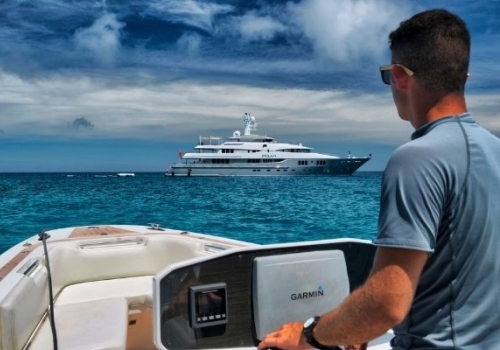
There’s a long-standing myth in yachting that working on a charter yacht equates to seeing the world on a bumped up salary in a party atmosphere while a private vessel spells a slower pace of life in a lower octane environment.
As anyone who works in the industry knows, however, it’s a lot more nuanced than that. In fact, the traditional thinking that crew are either ‘charter or private’ has given way to a much more fluid scenario – and as a result, culture has evolved too.
It’s not about being a chameleon as authenticity is embraced and encouraged over and above the need to make yourself fit.
Crew-Glue Managing Partner Sara Ballinger advises a flexible approach for a rewarding career in either context. “Authenticity is preferable to having multiple personas to suit whoever you happen to be talking to,” she says. “It’s about adapting your style, not your personality.
“If you’re someone with a full on, extrovert and fiery personality and your captain is more thoughtful and detail oriented, bounding onto the bridge unannounced and bombarding them with your latest idea might take them aback.
“Better to be more self-aware, temper your style, tone it down, ask for a few minutes of their time and then hit them with all that energy! That’s flexible, but not inauthentic.”
Luxury Hospitality’s Peter Vogel, a former fleet hospitality and event manager, advises a less superficial approach in the recruitment process in order to find crew who are the right fit whether the yacht is for charter or private use. “If you hire because people are pretty, you will roll into issues as you are not hiring with a view to a proper job fit.”
He also advocates the idea of treating every yacht as a business, adding: “Commercial or charter vessels are driven by a financial perspective. The purpose is to make money, and while running a private family yacht is different, if you still run it as a business, things become easier and more aligned. More owners are now talking that language and there has been an evolution in attitude.”
It’s wise for green crew to be wary of the perceived wisdom attached to charter and private craft, particularly as the fantasy often bears scant resemblance to the reality.
“Charter yachts are regarded as a fast-paced and exciting albeit demanding working environment,” says Luxury Hospitality’s Insight specialist Lynne Edwards, a former interior manager. “The sheer volume of work and long hours can be hugely underestimated by green crew until they actually experience it – and it doesn’t suit everyone!
“Green crew who believe it’s an opportunity to see the world can be disappointed when they experience it only from the deck or through a porthole, with the exception of a rare night or two off.”
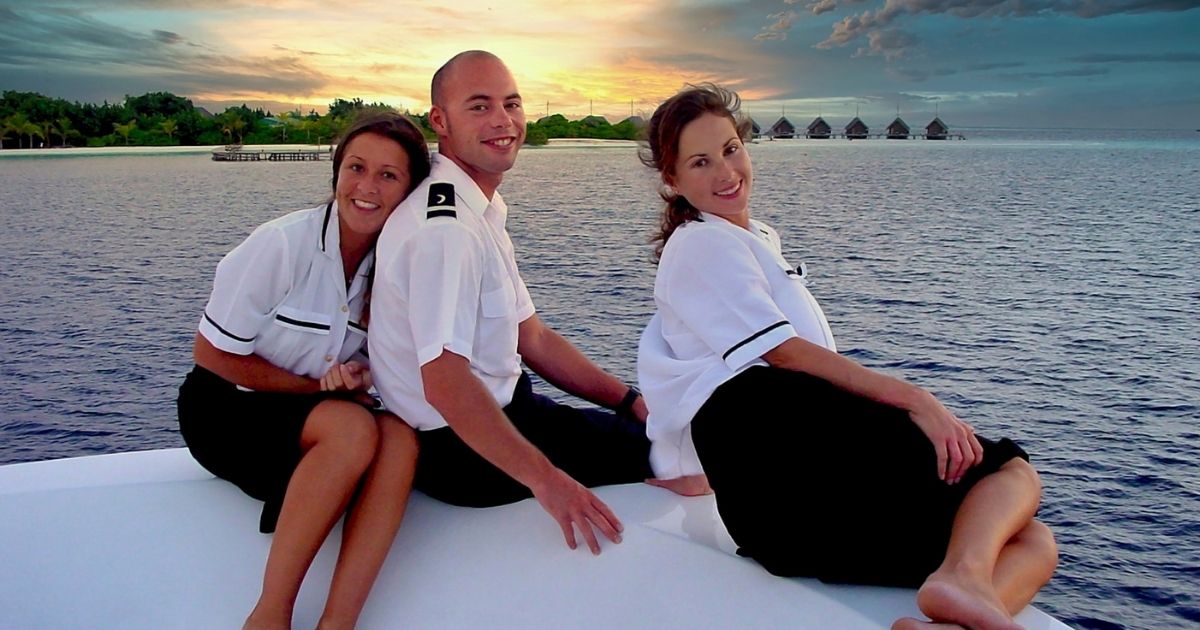
Crew retention can also be worse on charters, despite the incentive of substantial gratuities. “Burnout is rife, particularly on yachts which operate double seasons in the Med then the Caribbean or elsewhere,” adds Lynne.
“When people are exhausted and lacking in sleep, their tolerance levels drop, they start missing family and friends more and disengagement and friction sets in, aside from physical and emotional breakdowns.”
Peter agrees, adding: “On charter, there’s a lot of energy needing to be pumped out so you need creative, bubbly personalities who are willing to go for it and not think about ‘me’ time.”
Conversely, private yachts have long possessed the reputation for being a safer, less eventful, perhaps more boring bet.
“There are times when it can feel boring, just maintaining the vessel for an owner who may or may not get on for a boss trip,’ admits Sara. ‘Although there is still plenty to do, it doesn’t have the same sense of purpose and energy when you are going nowhere and serving no-one. Boredom and lack of enthusiasm can kick in.”
There’s no doubt that often, a charter will be a more stressful environment, especially for younger crew members. “The culture on a charter yacht is intense”, adds LH’s Emily Coates, a former first officer. “Tasks are done faster, stress levels are higher, crew celebrations after the charter are louder and the lows are lower. The work is focused around shorter deadlines and trying to achieve the wow factor to receive the best gratuity possible.
“There is less need to wow on a private yacht because the owner has seen it all before – and likes it - so there is less deviating from the script. The culture on the whole is calm and stable because there are more rest days and more time between trips.”
Lynne concurs, adding that private yachts often retain their team long term as they remain in port for long periods, making them an ideal choice for older crew for whom home life is as important as their yachting career.
“Privately owned yachts generally provide a more measured working environment unless the owner is an avid, perpetual entertainer of guests,’ says Lynne. ‘Crew can familiarise themselves with the owner’s needs and preferences but the fact remains that most owners, whether they charter their yacht or not, prefer to see the same faces when they spend time aboard.”
Talitha G Captain Giles Sangster has noticed increasing crew traffic between charter and private vessels, adding: ‘There is this myth that charter is busier and full of hidden riches whereas private is slower paced and lower paid but it depends entirely on the yacht.
“Charter is more intense and unknown. There is a steep learning curve in the first few days. If everything goes to plan, that will likely continue but when it doesn’t, it’s very difficult to pull ahead. You have to get creative and try new tactics.
“On a private/repeat charter trip, you know your client and you’re well prepared in terms of what to give and what to expect regarding routine, mealtimes and family preferences. However, an owner trip can be far busier than any charter trip based on the owner knowing what the yacht and crew are capable of.”
Sara can see why the charter/private myths have taken root. “I sometimes wonder if those for whom a more temporary style of employment, which creates more wealth but ‘is not forever,’ prefer charter while career yachties looking for security might prefer private,” she ponders. “I know many friends who love working on private yachts so it really depends on what you want from the job.”
With that in mind, Crew-Glue’s approach to team building and development combined with LH’s 360 training approach - which uses personality profiling to improve self-knowledge and self-awareness – exists to help crew understand their strengths and their purpose so they are better equipped to make the right job choice and be happy.
Lynne confirms: “Quite simply, it gives all crew the tools to rise to – and overcome – the challenges of even the most exacting situations.”
Images: Mark O'Connell

Post your comment
You cannot post comments until you have logged in.
No one has commented on this page yet.
RSS feed for comments on this page | RSS feed for all comments
Search articles with keywords

- Charter & Brokerage
- Yacht Design & New Builds
- Tenders & Toys
- Superyacht Events Calendar
- Career & Training
- Departments
- Superyacht Crew Finances
- Sustainability
- Shipyards and Marinas
- Health & Wellbeing
- Polar Region
- Our Services
- Meet the Team
Private Or Charter. Which Is Best For You?
.png)
Introducing our Crew 2 Crew blog, written by Captain Jack Brown. In this series, Jack will take you through a range of interesting topics exclusive to crew in the industry and lend his own valuable insight and experience.
When looking for a new job in the industry, whether you are brand new or a seasoned crew member, one question you will always be asked is; what’s your preference, private or charter?
Over the years in my career, I have worked extensively on both private and charter yachts. Whether that be impeccably run privately owned yachts that sail off the beaten track or back-to-back busy charter yachts doing the ‘milk run’, I have always found both to have their great advantages and enjoyments.
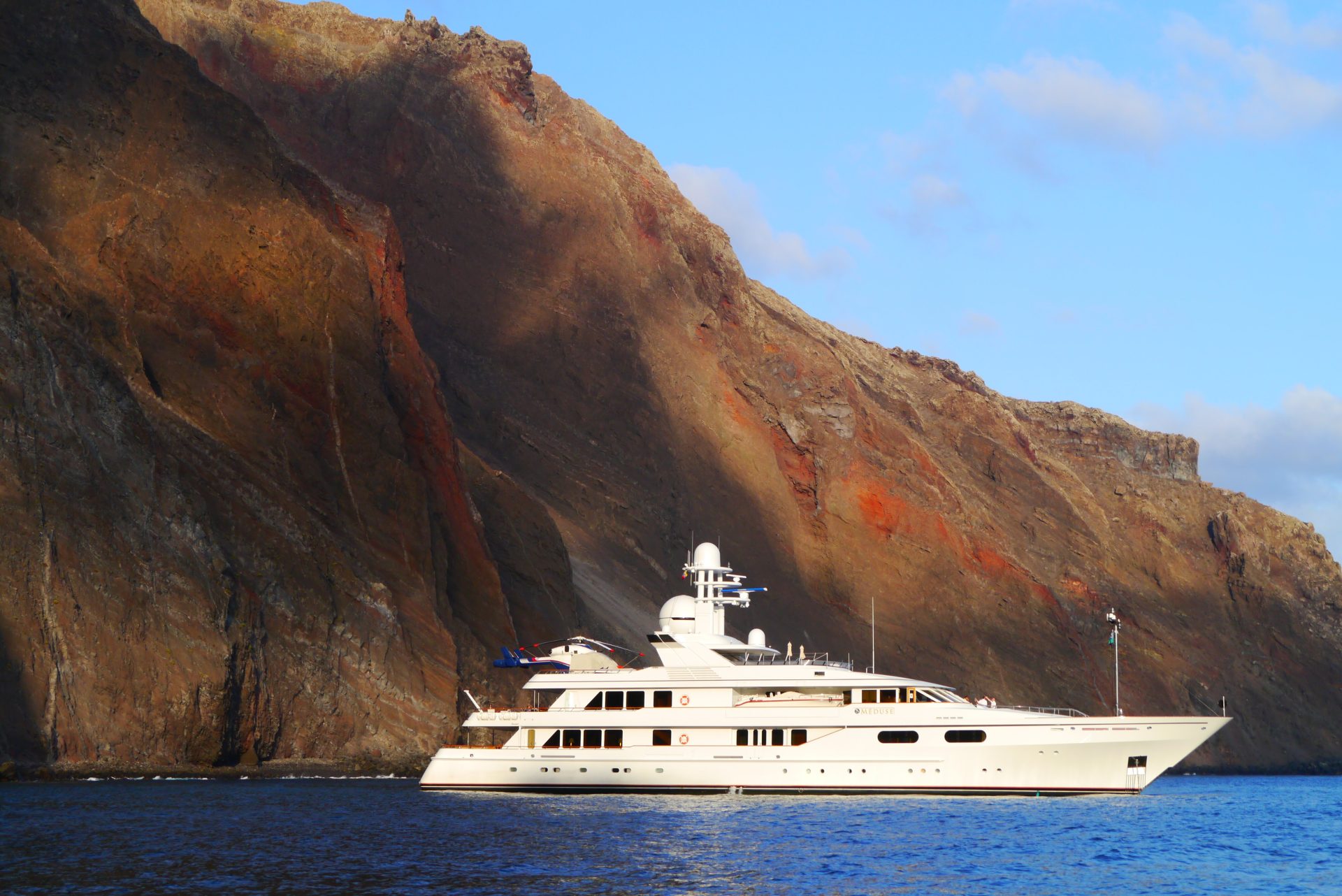
What It Means To Go Private
Working on a private yacht can come with many different requirements depending on the owner’s preferences, from live aboard relaxed programmes, immaculately kept rarely used yachts, faceless and unseen service, adventurous dive plans or familiar family feel guests, the differences between yachts can be worlds apart.
The main feature that unites the differences between private programs is the understanding of preferences for the owners and guests, being able to predict the breakfast requirements of each family member or exactly what time the grandchildren will start water sports for the day. In most cases the owners of the yachts will use them as an extension of their homes or offices, stepping on board and going straight into their usual routines of work or relaxation.
What Itineraries Look Like
Itineraries on private yachts can vary and evolve as the trip goes on, most private yachts where the owners are on for longer periods will have a more free flow schedule of going where the weather allows or coming up with ideas during the cruise, meeting friends and family along the way. Sometimes berth bookings are kept just in case, or planned for once a week to allow for provisioning. A seasoned yacht owner will know the logistics of cruising, be it bunkering every couple of weeks or provisioning every few days, they will often appreciate the crew have been working on board for weeks on end without days off and hopefully allow downtime or meals off the yacht to give the crew a break.
Working Private: What It Takes
To be appreciated as a crewmember on a private yacht, you should possess a combination of professionalism, discretion and confidentiality. After all, you are often privy to sensitive information and the private affairs of the owners.
You should also be committed and flexible as you could be on board for extended guest trips without knowing the date the guests will depart, its also worth remembering most owners like to see the same faces when they get back on board for their next voyage and regularly crew are rewarded for their loyalty. You should be proactive and anticipate the owner’s needs, providing exceptional service and attention to detail, many owners are much more involved and vocal in the standards kept on board.
Strong interpersonal skills are vital, crew often develop closer relationships to the owners and you need to build rapport and communicate effectively with them in order to excel in providing the seven star service they expect.
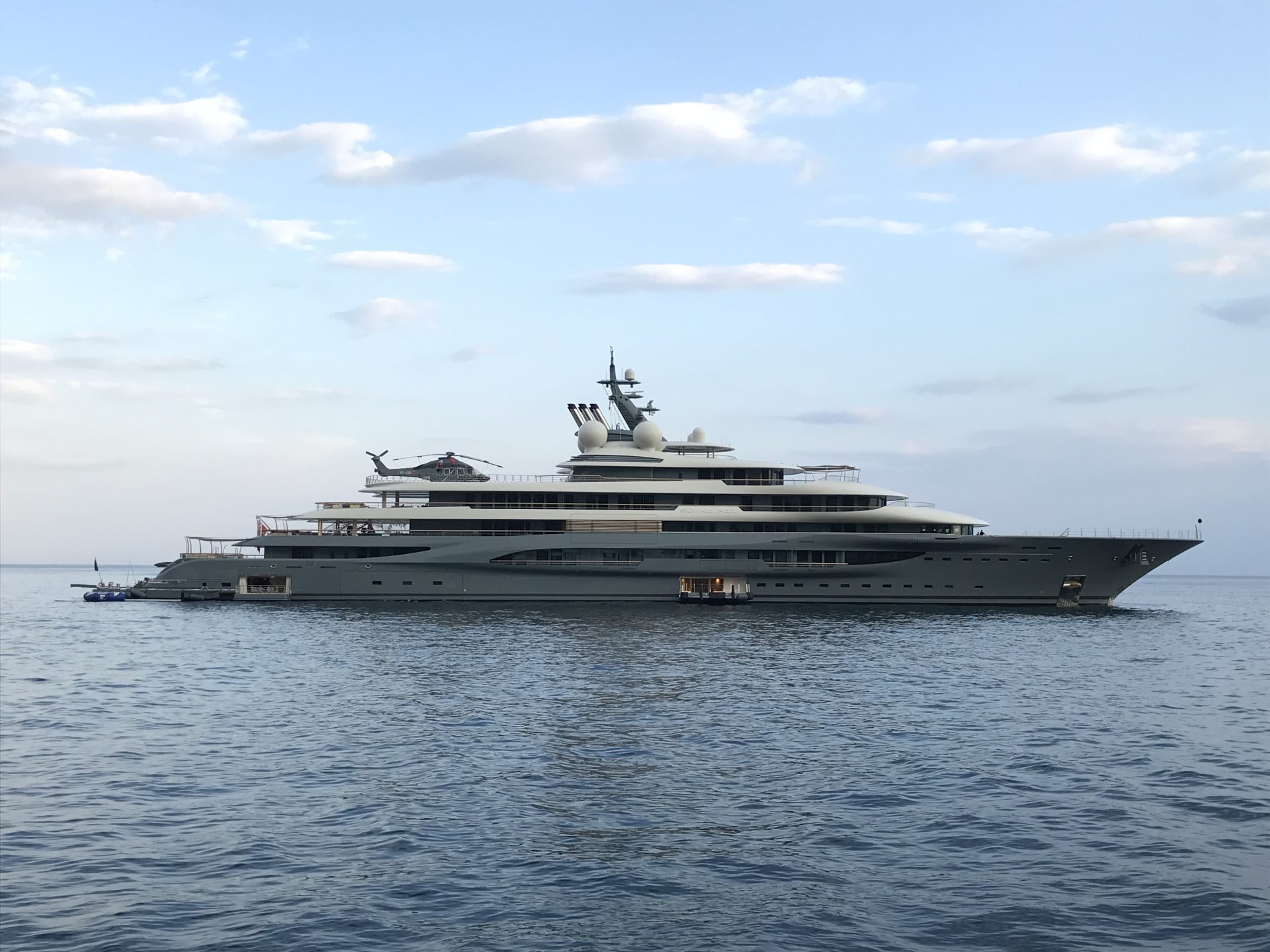
On Charter Yachts
On charter yachts the crew typically interact more frequently with guests in a fun and entertaining way, either putting on theme nights for dinner, water sports challenges and coaching, guest and crew BBQs, treasure hunts, excursions ashore and a plethora of other fun activities, they are responsible for providing impeccable service, entertaining the children, organizing activities, and ensuring the guests have a ‘once in a lifetime’ experience. You might find it’s the charter guests’ first time on a superyacht and want to experience everything they have imagined when stepping foot on board a floating palace.
Charter Itineraries
The itinerary for a charter is usually set ahead of time with an agreed start and finish point and a daily schedule to stick to in order to visit all the agreed locations within the timeframe.
This can often mean moving anchorage or into port multiple times a day in order to see those breath taking locations or to meet a critical dinner date. This can be very taxing on the crew, packing up and setting up water sports equipment, meal services and mooring equipment, what can start off as a predictably active day can suddenly change into ‘all hands on deck’ with a sudden request to tie up in port or an anchorage shift to meet up with the guests’ friends on another yacht.
How To Be A Valued Crew Member
In order to be an valued crew member on a charter yacht you need to be physically fit with good stamina in order to deal with the extensive hours on your feet and the demanding activities, have a customer service orientation to give the ultimate attention to the guests, be friendly, outgoing and ready for the numerous questions asked throughout trips and be an adaptable problem solver to deal with the hundreds of different requests and changes in a day.
You must manage stress effectively, stay professional at all times and have a heightened attention to safety in order to keep the guests and crew out of harms way at all times, especially as they are unlikely to have much seafaring experience.
To Conclude
So what is it? Private or charter?
Both private and charter yachts can be challenging and demanding places to work, whether you are cut out to work on either is determined by your attitude, commitment and approach to the exclusive superyacht industry. They both have their great benefits of travel, high earnings, professional development and diverse networking, all the while working within close attractive team environments.
The best advice to give is to get out there, be professional, work hard and enjoy it!
Crew 2 Crew blog is written by Jack Brown.
Throughout his career, he has acquired extensive experience in the superyacht industry, having worked on both private and charter yachts (50m-85m) across the globe, including the Mediterranean, Caribbean, Pacific Ocean, Indian Ocean, Atlantic Ocean, USA, and North West European waters.
His expertise extends to overseeing significant refits, exceptional navigational knowledge, articulating expectations clearly and concisely, demonstrating robust project management skills, emphasising safety as top priority and excelling in fast, creative problem solving.
Jack is committed to delivering an exceptional experience onboard, creating a relaxing environment with endless opportunities for fun and exploration, utilising the incredible advantages a superyacht has to give the owner. He offers a safe, professionally run, hassle free environment onboard so that the owner can enjoy his asset to its fullest.
To keep up to date with the latest Superyacht Content News, click here .
Sign up to our Newsletter below:
Newsletter Signup
- Your Name First Last
- Your Email *

Related articles
The crew network – top jobs this week, international women’s day 2024: hearing from the women in the superyacht industry, 14 nautical reads for world book day.

Popular Posts
- M/Y Lady M Sold By West Nautical
- The ACREW Crew Awards Come To Porto Montenegro For The First Time
- Here is an intimate way to share your best yachting experiences.
- Rolls-Royce Acquires Italian Yacht Supplier
- What To Expect At The Superyacht Charities Ball 2023
Superyacht Content
Social media influencer and digital brand expert.
Superyacht Content brings you the latest in social news for the superyacht industry.
Keep up to date with us across our social channels, and don’t forget to hit that share button!
- Superyacht News
- Superyacht Jobs
- Superyacht Marketing
Join our Newsletter
Copyright © 2023 Superyacht Content | Website Design by Zonkey
Privacy | Credits | Get in Touch
A Beginner’s Guide to Chartering a Yacht
By Chrissie McClatchie

With the pandemic driving a boom in superyacht charters , more and more people are taking to the water for their first yachting experience. But while some superyachts can cost more than a million a week to charter, you don’t need to outlay seven figures for your own yachting vacation.
Wondering what else you need to know before stepping on board for the very first time? We’ve turned to experts in the yachting industry for their insider intel on how to charter a yacht like a pro—from how much it will run you, to where to go, and well beyond. Read on.
Do I need a charter broker, and how do I find one?
It’s a charter broker’s job to match you with the right yacht and crew—and then take the lead in planning the entire experience. Professional bodies such as MYBA The Worldwide Yachting Association act as a database of industry-recognized professionals. But the best source for finding a charter broker is often your own network. “Building up a relationship with a charter broker is very important,” says Jacqui Lockhart, a Monaco-based broker at Camper & Nicholsons International . “If possible, look for a recommendation from a friend.”
Once you’ve found the right broker, communication with them will be key. “Take the time to be as detailed with your preferences, such as dietary requirements, likes and dislikes, and preferred activities, as possible,” says London-based broker Charles Crane of Edmiston . “This will give us and the crew the best information to make the charter a success and tailored to perfection.”
How much should I be prepared to spend?
“The entry point is around $40,000 for a week on a yacht 82-feet upwards that can sleep six people," says Lockhart. What can take first time charterers by surprise is that this isn’t an all-inclusive figure. “The charter fee covers the hire, the crew, the insurance—everything that’s linked to the yacht,” Lockhart continues. Anything specifically for the client is extra—including food and beverages, fuel, and dockage. As a rule of thumb, budget for an extra 30 percent on top of the baseline charter figure for these extras, which goes into a fund known as the Advanced Provisioning Allowance (APA). At the end of the charter, it is also customary to tip the crew; between 10 and 20 percent of the charter fee is a guideline figure. There may also be Value Added Tax (VAT) to pay on the charter rate, depending on the country of embarkation.
At the smaller end of the charter fleet, more opportunity exists for single-cabin bookings rather than whole yacht charters. This year in the Caribbean , Sheila Ruffin of Soca Yacht Charters has launched a “Stranger on the Seas” package. Prices start at around $6,000 per person—all-inclusive—on catamarans between 48 and 60 feet. “This allows couples the opportunity to mix and mingle with other couples for an adventurous and social yacht charter on the Caribbean Sea,” says Ruffin.
What destinations are best suited to first-time charterers?
“For first-timers, I wouldn’t recommend a remote destination,” says Captain Kelly Gordon of Freddy , a 106-foot charter yacht based out of the Bahamas . “When it’s hard to get to, that eats up some of your valuable time and can also take some of the fun out of it.”
While yachts are heading towards unchartered waters such as Antarctica with increasing frequency, cruising grounds in the Mediterranean and the Caribbean are classic destinations for a reason. “For the first-time charterer in these locations, there will be more yacht options to choose from, proven cruising grounds with known and safe anchorages, well-connected and easy access hubs to ensure smooth passage to embark and disembark the vessel as well as the ability to source most provisions that guests may want,” says Crane.
The key ingredient? The crew.
Although much of the focus is on securing the right yacht, the secret to the success of a charter is its crew. “Put simply, the crew make the difference between a good charter yacht and a bad one,” says Crane. Today’s crew are increasingly versatile. “They may also be a diving or yoga instructor, personal trainer, fisherman, or sommelier,” he continues.
The crew also knows your cruising area better than anyone else. “Be sure to pick their brain on fun things to do. They often love the opportunity to come up with fun activities and games, whether for kids or adults,” says Lotte Barker-Hahlo, a London-based charter broker at Burgess .
The level of hospitality from crew on most yachts often convert first-time charters into repeat customers. “The attention to detail from the crew is unsurpassed by any other luxury holiday,” says Barker-Hahlo. “From the unpacking of your suitcase to being offered a drink before you’ve even realized you’re thirsty, it’s 24-hour care and service.”
Gordon says that much of the feedback she receives at the end of a first-time charter is why didn’t we do this earlier? “People are always surprised at how we take the time to get to know their needs before they have even arrived. We really do study those preference sheets!”
Think carefully about who else you want on board
Another important factor to a successful yacht vacation? Your fellow travelers. This is a specific type of vacation, which should narrow your list of invitees. “Strongly consider who you vacation with when chartering a yacht,” urges Ruffin. “Unlike other vacation options, yachts are very intimate and exclusive. Choose to share your water adventure with those you like and will enjoy on the water for a week or more.” Maybe, even for veteran yachties, that's the sagest advice of all.

The global authority in superyachting
- NEWSLETTERS
- Yachts Home
- The Superyacht Directory
- Yacht Reports
- Brokerage News
- The largest yachts in the world
- The Register
- Yacht Advice
- Yacht Design
- 12m to 24m yachts
- Monaco Yacht Show
- Builder Directory
- Designer Directory
- Interior Design Directory
- Naval Architect Directory
- Yachts for sale home
- Motor yachts
- Sailing yachts
- Explorer yachts
- Classic yachts
- Sale Broker Directory
- Charter Home
- Yachts for Charter
- Charter Destinations
- Charter Broker Directory
- Destinations Home
- Mediterranean
- South Pacific
- Rest of the World
- Boat Life Home
- Owners' Experiences
- Interiors Suppliers
- Owners' Club
- Captains' Club
- BOAT Showcase
- Boat Presents
- Events Home
- World Superyacht Awards
- Superyacht Design Festival
- Design and Innovation Awards
- Young Designer of the Year Award
- Artistry and Craft Awards
- Explorer Yachts Summit
- Ocean Talks
- The Ocean Awards
- BOAT Connect
- Between the bays
- Golf Invitational
- Boat Pro Home
- Pricing Plan
- Superyacht Insight
- Product Features
- Premium Content
- Testimonials
- Global Order Book
- Tenders & Equipment
Yacht classification definitions
The merchant shipping sector is ruled by safety regulations developed since the beginning of the 20th century, and is familiar with international conventions such as SOLAS, MARPOL and Load Lines. But the application of common safety requirements to pleasure vessels is something relatively new – a continuous work in progress – and is very much dependant on the service and the flag of the yacht.
Defining the problems
Definitions do not help. How often have we read of large yachts, superyachts, megayachts, gigayachts or other bombastic adjectives? How many times have we mentioned MCA, RINA, and Lloyd’s, without having a clear idea of who’s doing what?
A good starting point for understanding the subject is to clarify the main definitions and the roles of the main players:
Large yacht
A large yacht is a pleasure vessel with a load line length equal to or over 24m. Almost all the flag administrations have adopted safety codes dedicated to large yachts and this is, therefore, the only definition having a universal meaning in the international regulatory framework of yachts.
Commercial yacht
A motor or sailing vessel in commercial use (i.e. charter) for sport and pleasure, carrying no cargo and not more than 12 passengers.
Private yacht
A pleasure vessel solely used for the recreational and leisure purpose of its owner and his guests.
Flag administration
The government of the state whose flag the yacht is entitled to fly . This administration sets the safety regulations, manning requirements and fiscal aspects relevant to the yacht registration.
Different flag administrations can inspect the safety aspects of yachts with their own inspectors (see MCA for example) or delegate this activity partially or totally to other recognised bodies such as the classification societies.
The main flag authorities in the yachting industry are: The UK-MCA, Cayman Islands, Isle of Man, Malta, the Marshall Islands, Italy and Luxembourg.
Classification societies
Organisations that establish and apply technical standards in relation to the design, construction and survey of ships.
Classification rules are developed to assess the structural strength and integrity of the essential parts of the hull, the reliability and function of the propulsion, steering systems, power generation and all the other features installed on board which contribute to guarantee the main essential services.
In addition to this ‘third party check’ function, class societies carry out statutory duties on behalf of the major flag administrations in accordance with specific delegation agreements signed with each government.
The main class societies involved in yachting are: American Bureau of Shipping, Bureau Veritas, Det Norske Veritas, Germanischer Lloyd, Lloyd’s Register, and RINA.

Large yachts: Applicable rules and certificates
Private yachts
The mandatory requirements for these boats are very light. For the majority of flag states, a registration survey and a tonnage measurement, carried out by an authorised surveyor, are sufficient.
The only mandatory international conventions are those relevant to the marine environment: MARPOL and the Anti-Fouling System Convention.
The International Convention for the Prevention of Pollution from Ships (MARPOL) is intended to eliminate the intentional pollution and to minimise the accidental pollution of the marine environment caused by harmful substances.
The Anti-Fouling System Convention’s purpose is to eliminate the presence of harmful substances for the marine environment contained in anti-fouling paints applied to ships.
Classification
While classification is not mandatory, building and maintaining a private yacht in class is the only evidence that the boat has been designed, constructed and operated in compliance with appropriate technical standards. It is therefore highly desirable, especially in relation to insurance and re-sale purposes.
Commercial yachts
All flag administrations require commercial yachts to be certified in accordance with a specific large yacht safety code.
The most popular of these safety codes, and the first that was developed, is the MCA Large Commercial Yacht Code (LY2) published in 2004. It replaced the Code of Practice for the Safety of Large Commercial Sailing and Motor Vessels (LY1) published in 1997.
LY2 is applied by the Red Ensign Group Flags (UK, Cayman Islands, Isle of Man, Bermuda, Gibraltar, British Virgin Islands, etc.) and is recognised as a reference standard for all the yachting industry.
Other flags have developed similar codes. Luxembourg, Italy, Marshall Islands, Malta, Belize and The Netherlands are some examples.
While introducing a stricter set of rules and regulations compared to private yachts, commercial registration offers yacht owners the possibility of making a profit from the chartering activity of their boats, and allows them to take advantage of all the other benefits of a commercial operation (in particular VAT exemption on the purchase, sale, bunkering, provisions, dry-docking, and others).
Mandatory certificates
The number and type of the mandatory certificates depends on the size of the vessel; the following is an indicative list:
- International Tonnage Certificate : A measurement of the internal volumes of the yacht expressed in gross tons (GT). This measurement should not be confused with displacement tonnage, which quantifies the weight of a vessel.
- Large Yacht Code Certificate : Covers life-saving appliances, fire protection and means of escape, navigational and signalling equipment, intact and damaged stability, manning and crew accommodation.
- Class Certificate : This mainly deals with the yacht’s hull, machinery, electrical equipment and outfitting.
- International Load Line Certificate : This certifies the weather-tightness of the yacht.
- Safety Radio Certificate : This is applicable if gross tonnage exceeds 300GT This concerns the radio communication and distress installations.
- MARPOL Annex I Certificate : This is applicable if gross tonnage exceeds 400GT This deals with the disposal of oil and bilge water from machinery spaces.
- MARPOL Annex IV Certificate : This is applicable if gross tonnage exceeds 400 or the yacht is certified to carry over 15 persons. This deals with the disposal of sewage from ships.
- MARPOL Annex V : This is applicable to all ships. It covers the disposal of rubbish.
- MARPOL Annex VI : This is applicable if gross tonnage exceeds 400GT as well as to all main and auxiliary engines with a power exceeding 130kW. It concerns the emissions from main and auxiliary engines (NOx and SOx).
- Safety Construction and Safety Equipment : These are additional prescriptions on machinery, electrical parts, life-saving and navigational equipment for yachts with a gross tonnage above 500GT.
- International Safety Management Certificate : This is only applicable to yachts having a gross tonnage greater than 500GT. A certified management company is requested to carry out this service, preparing operational manuals, procedures for drills, and taking care of the maintenance of the yacht and its installations.
- International Ship and Port Security Certificate : This is only applicable to yachts having a gross tonnage greater than 500GT and deals with the anti-piracy certification. A certified management company is requested to provide the ashore assistance and establish on-board procedures and operational manuals.
The GT Factor
The gross tonnage value (GT) is a key issue, not only as a reference for the registration fees applied by the different flag administrations, but also because it determines whether an international convention, rather than a particular safety standard, applies to a yacht.
The table below summarises how the conventions and relevant certificates come into force depending on the gross tonnage of the yacht. In particular, the following values may have a critical impact:
300GT: In many codes, when you reach this value the yacht must be certified in unrestricted service (stricter requirements regarding stability, load line and life-saving appliances).
400GT: This is the threshold for almost all the environmental conventions such as MARPOL and Anti-fouling System.
500GT: This is the threshold for the application of the SOLAS Convention, meaning stricter requirements on machinery, safety systems, materials of construction, fire protection, life-saving appliances and navigational equipment. Furthermore an external certified management company is requested for the ISM and ISPS certifications.
The tonnage issue could also arise on existing yachts when undertaking major refits or modifications, in that any change to the internal volumes of the boat – such as adding enclosed deckhouses or superstructures, or modifying the hull transom or bow – will modify the tonnage value with the risk of subjecting the yacht to stricter mandatory rules.
UPDATE: Since this article was originally published, LY2 has been superseded by Large Commercial Yacht Code Revision 3 (LY3) .
More stories
Most popular, from our partners, sponsored listings.

Welcome Back
Sign in to your account
By continuing, you agree to our Terms of Service , and Privacy Policy
Don't have an account? Sign up
Create an account to get started
Already have an account? Log in
Reset Password
Enter your username or email to reset your password
Remembered your password? Log in
Submit Favorites
Once you submit your favorites, we will begin the process of matching you with your perfect yacht.
We will be in touch shortly with more information. In the meantime, you can continue to add or remove selections.
Not ready just yet? Manage favorites
All done for now? Log out

- -->(207) 882-7855
- Sign Up | Log In
- Create an Account
Home ~ Resources ~ Cruise Ship vs. Private Yacht Charter
- Cruise Ship vs. Private Yacht Charter
Book a cruise ship or charter your own private crewed yacht… two very different vacations.
A Vacation on Your Own Private Crewed Yacht Visit remote beaches and islands that cruise ships and hotel guests never see. Wake up in a different pristine bay each morning. Enjoy breakfast in bed or watch the world wake up from the cockpit. Sail, snorkel, scuba dive, hike, explore ashore or just relax in a hammock. You set the pace, the itinerary and the day’s activities, day by day.
Dance under the stars on a beach after enjoying a fabulous dinner created by your personal chef, exactly to your preferences.
A Cruise Ship Vacation Passengers on a typical Caribbean cruise vacation sail with 1000 to 2000+ other people, from port to port, where they are greeted by throngs of merchants eager to make a quick profit and tour buses to take them to the same old sites. If you long to see the true beauty of the area, with just your friends, book a private Crewed Yacht Charter. It costs no more to have a yacht for yourself.
Remember, if you want to visit those duty-free stores, book your return flight from St. Thomas or St. Martin and you can spend your last day shopping at your own pace without the cruise ship crowds. As a savvy traveler, you might even get a better deal!
Want to Know More? Contact us or visit our Crewed Charters page
- Bareboat Charters
- Bareboat Yacht Search
- Bareboat Companies
- Why Book A Bareboat Charter with Us?
- Am I Qualified To Charter a Bareboat?
- Bareboat Specials
- Crewed Charters
- Crewed Yacht Search
- Why Book a Crewed Charter with Us?
- Crewed Specials
- Megayacht Search
- Charter Destinations
- Spanish Virgin Islands
- St. Vincent and the Grenadines
- French Riviera
- French Polynesia
- Nassau – Exumas
- New England
- Plan Your Charter
- 3 Ways to Charter a Yacht
- First Time Charterers
- Import Restrictions
- Passport Requirements
- BVI Fishing License
- BVI Ferry Schedule
- Learn to Sail
- Scuba Diving
- Caribbean Weddings
- External Resources
- Request Boat Info
- Give Feedback
Experiences
- Destinations

Luxury Yacht Charters vs Cruise Ships
Why it’s time to consider a luxury yacht for your next vacation.
For most people, chartering a private yacht seems an unattainable dream- something that only the super-rich could ever afford. Most of us who dream of adventure and luxury at sea therefore settle for taking a cruise on one of the fancier liners. When we come into port we might look a little wistfully at the private yachts, but conclude that they would be too expensive to charter, too out of reach- even on our good incomes.
Todd Beechey founded OceanScape Yachts after having exactly that experience. While in Nassau on a cruise vacation, Todd and his wife wandered around the superyacht marina and dreamt of chartering a yacht one day- they even joked about winning the lotto. They concluded that it would be far too expensive, and thought it would remain just that- a dream, a fun conversation to pass the time on a sunny Bahamian afternoon. But the idea of chartering a yacht just wouldn’t let go.
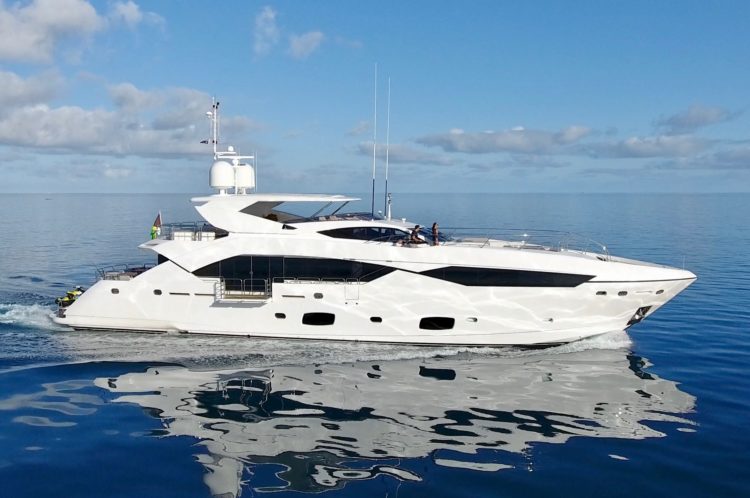
So rather than leaving it at that, Todd decided to actually find out: How much is it to charter a yacht- and can luxury cruise ship passengers really make the switch to private yachts?
What he discovered-the secret that very few realize-is that if a group of you are paying for the luxury experience on a cruise ship you could have actually all pitched together and chartered a private yacht instead.
And with more yachts flooding the market as the industry grows, the luxury yachting experience is becoming more affordable with each passing year.
Not only did Todd start chartering stunning yachts with his family and friends year after year, but the idea for OceanScape Yachts was born: the idea of making the extraordinary yachting experience attainable for people who had never imagined it was possible.
So, how expensive is chartering a yacht, really?
The luxury end of the cruise ship industry is undergoing a massive boom. We know that a great many of you are already spending at least $6,000+ per person on all-inclusive cruise vacations, which equates to $12,000 per cabin. We also know that lots of you are spending more than that again- in fact 34% of luxury cruise ship passengers are spending more than $7,000 per person. That’s a very good start towards a yacht charter vacation if you’ve got some friends who’d like to make the step up to luxury yachting.
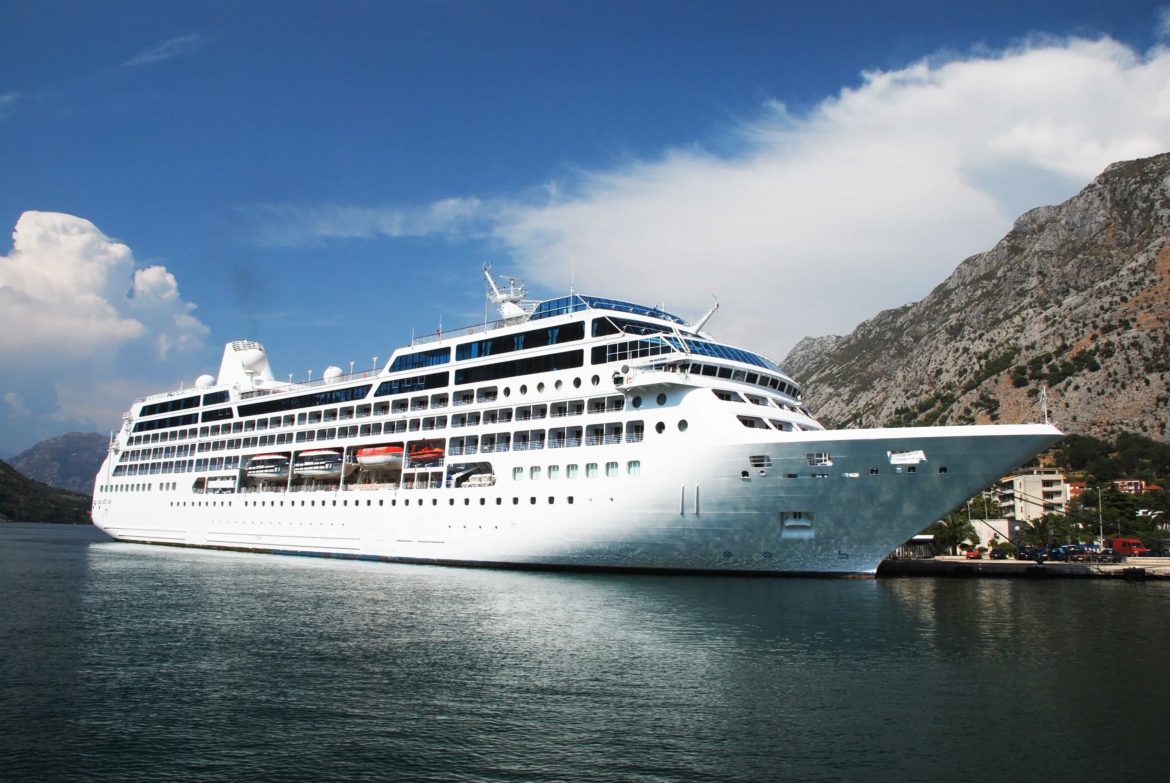
It’s worth noting here that if you do travel as a couple and have no interest in travelling with friends or family, then the cruise ship option is a better option financially as you would have to absorb the entire cost of yacht charter on your own. (We’re not in the business of pulling the wool over your eyes.)
It’s when you travel with groups that things start to get very interesting on cost comparisons.
A private yacht has a license to sleep up to 12 guests, but at the smaller end 8 guests is more common, so let’s start with that to keep the comparisons realistic. If each person is spending $6,000 on a cruise ship vacation, you and your partner could raise $ 48,000 for a yacht charter by pooling your money together with just three other couples. (Of course, if you were to get a yacht with ten beds you could raise $60,000, and twelve beds you could raise $72,000 towards the cost of charter.)
Remember though, that while cruise ships tend to be all-inclusive or mostly so, on a private yacht you need to pay for food and beverage, fuel, berthing fees and tips on top of your base rate. That’s why OceanScape Yachts have an all-inclusive model available to keep costs transparent.
So let’s assume that using the eight-person model raising a total of $48,000 you can charter a yacht with a base rate of $32,000-with some money left over to pay for the extras.
What kind of yacht will we get for $32,000 a week?
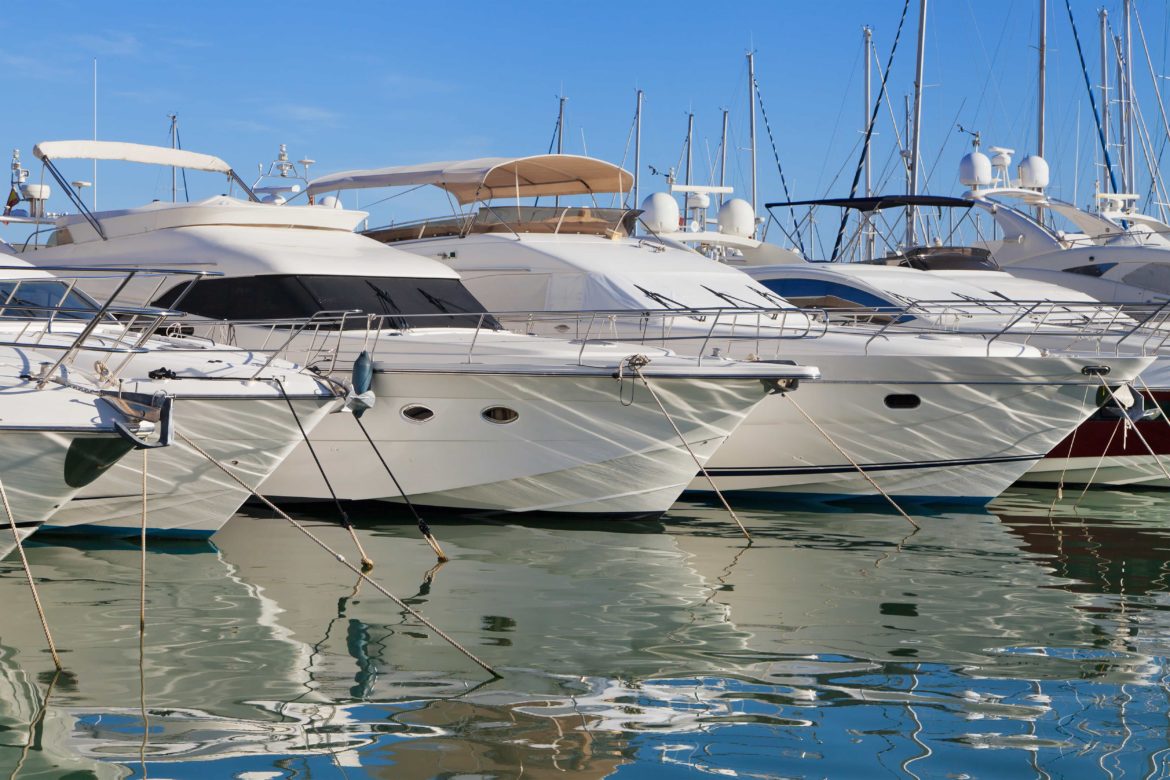
I’m afraid you’re not going to get one of the ones you see on TV with a helipad and huge lap pool, but you will get a fantastic luxury yacht in the 80-100 foot range for that kind of money. As mentioned, it will probably have cabins for eight people, although the rare few will sleep up to 12.
In this size range the yacht will normally have two decks, a deeply comfortable main salon, dining areas and a larger master cabin. The yacht will carry a range of watertoys, AV equipment and will almost certainly have WIFI and flat screen TVs in all cabins. And of course, you’ll have a team of crew dedicated to you for the entire vacation- including the captain, stewardess and private chef.
If you put in a couple of thousand extra per person you can charter a yacht with a base rate of around $40-$45,000, at which point you can expect to get a larger, more luxurious yacht nearing the 100-120 foot mark, particularly on the older models. At this size of a yacht you will often get a Jacuzzi, a main deck master suite, larger deck spaces and an upper salon. You’ll also have a bigger crew, and potentially an extra cabin or two to bring the number of guests up and costs down. However, remember that berthing fees, fuel and tips will also go up with larger yachts, so take that into account when budgeting.
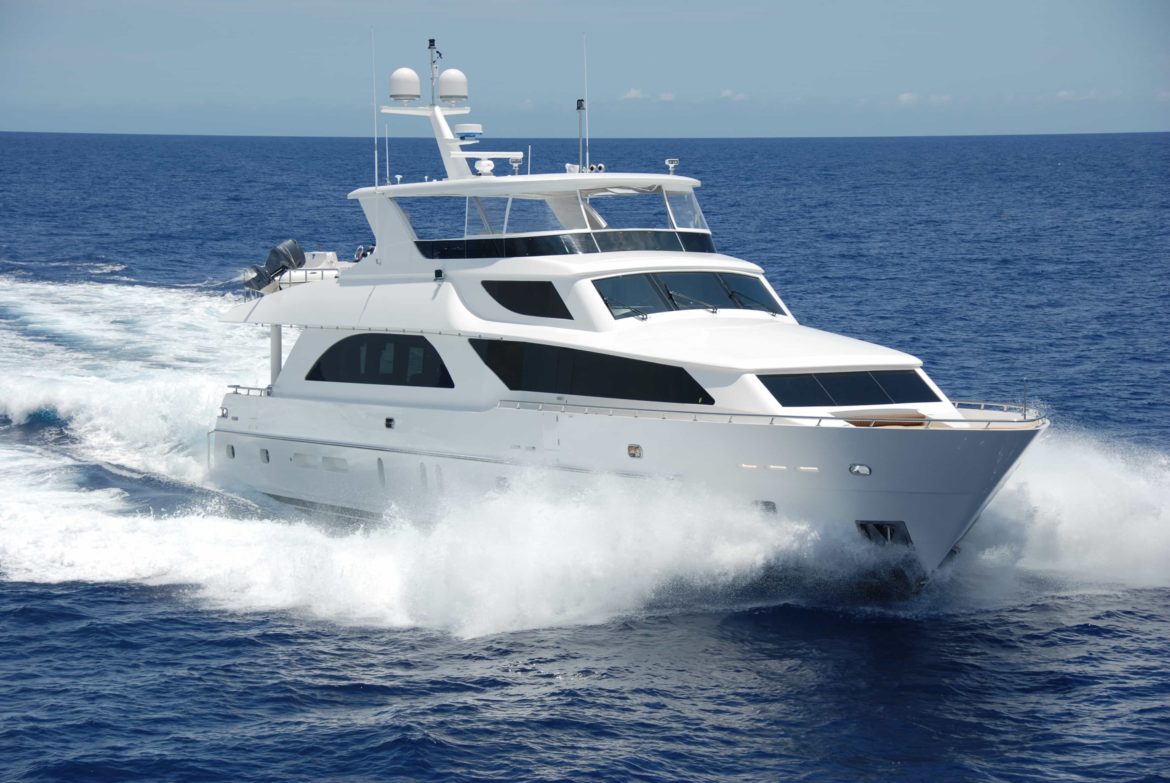
The total cost of your vacation on this size yacht will be in the range of $60-70,000 for the group- still quite comparable to the cost for that same group on a luxury cruise ship.
Why should I make the swap? What’s so great about private yachts?
We don’t mean to criticize cruise ships, but private yachts are another level of luxury entirely. The freedom is exquisite. You’ll speak to your captain each day about the itinerary, you can change your mind whenever you like, and above all, there are none of those awful orange boats bringing you back from a shore excursion when you’re simply not ready to leave. Don’t forget that the private yachts can get into the shallow anchorages and pretty marinas that cruise ships can’t hope to.
On a private yacht, the chef cooks just for you and your friends or family. They’re informed about your food preferences and any allergies, and the yacht is stocked with all your favourite things before you arrive. Each meal is served at a beautifully decorated table on deck and there are no buffet queues or complete strangers making small talk over dinner.
A yacht is an extremely private place to spend time with family and friends where the crew respect your personal space but are always discreetly on hand if you need anything. On a luxury cruise ship, much is made of the butler service, but that is restricted to your room, and when you’re roaming the ship you are just one of many hundreds of guests.
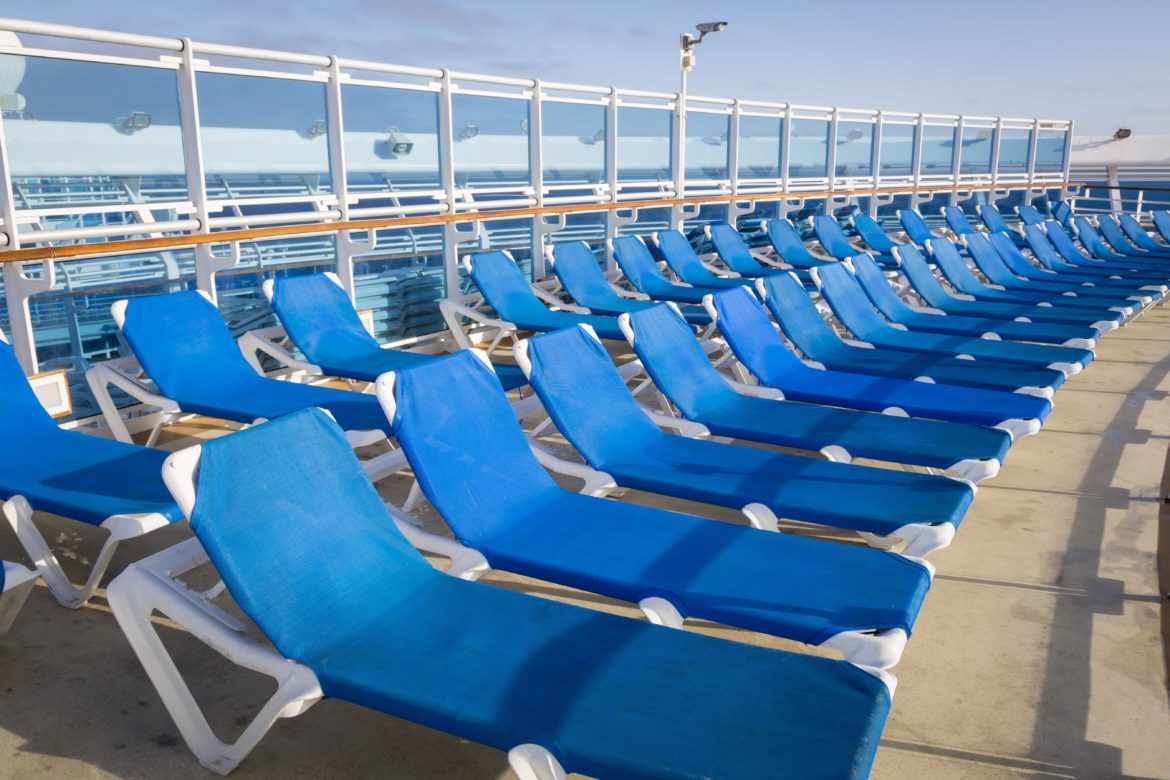
On a luxury yacht, the crew are dedicated just to you and no-one else, whether it’s the deckhand giving you another wakeboarding lesson, the chef grilling the fish you just caught for lunch, or the captain driving you to that nearby reef for a snorkel before breakfast. The stewardess or steward makes sure your cabin is always kept immaculate and keeps you constantly refreshed with food and drink. A yacht charter is all about freedom, privacy, superb food and wonderfully personalized service that cruise ships simply can’t match.
On a cruise ship, you’re just another number in the crowd. On a luxury yacht, you are the star.
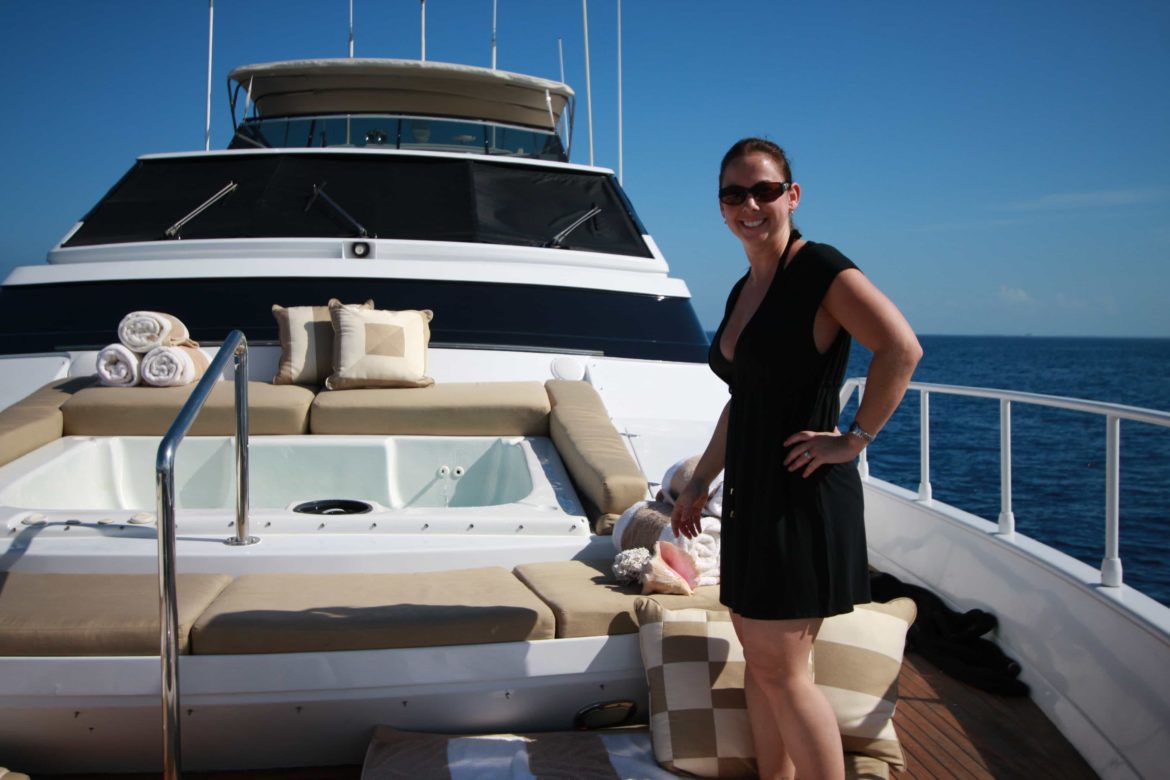
Put it this way. You’ll never imagine making the switch back. Just ask Todd Beechey.

- The Experience
- The Destinations
- OceanScape Club Premium Membership
- Privacy Policy

Chartering a Yacht: A Guide to Luxury Vacation Experiences
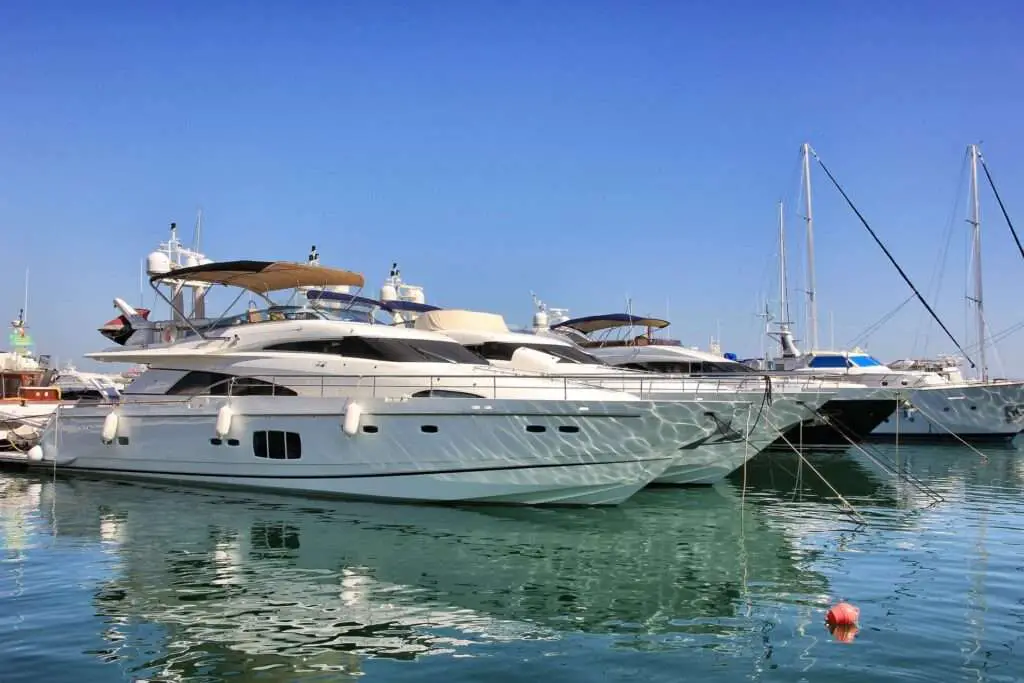
What is yacht chartering?
Yacht chartering is the practice of renting a private yacht for a specific period of time to explore destinations of your choice.
Chartering a yacht is a popular way to indulge in luxury travel, whether it’s for a romantic getaway or a family vacation.
Table of Contents
Is it worth it to charter a yacht?
Chartering a yacht may not be a cheap option, but the benefits that come with it make it a worthwhile experience.
For starters, yacht chartering offers an unparalleled level of privacy and exclusivity, making it an ideal option for those looking for a unique and luxurious vacation experience.
Moreover, a yacht charter offers a customizable itinerary, allowing you to explore destinations at your own pace. Whether it’s relaxing on secluded beaches or indulging in gourmet meals onboard, the experience is tailored to your preferences.
Additionally, chartering a yacht gives you access to world-class amenities, such as onboard chefs, spa treatments, and water sports equipment.
Chartering a yacht is not only a luxurious experience but also a memorable one. It’s a perfect opportunity to make unforgettable memories with friends, family, or loved ones.
Overall, the benefits that come with yacht chartering make it a worthy investment for those seeking a unique, exclusive, and unforgettable vacation experience.
Also Read: Buy A Boat Vs Charter A Boat Vs Fractional Ownership
Types of yachts available for charter
There are a wide variety of yachts available for charter, each offering unique amenities and experiences. Some popular types of yachts include:
1. Motor Yachts: These yachts offer luxurious amenities and speed, making them ideal for those who want to cover a lot of ground during their vacation. They often have multiple decks, spacious living areas, and comfortable cabins.
2. Sailing Yachts: For those who prefer a more traditional sailing experience, these yachts are perfect. They offer a slower pace and the ability to explore more remote destinations, while still providing a comfortable and luxurious experience.
3. Catamarans: Catamarans offer more stability than traditional sailing yachts, making them ideal for those who are new to sailing or prone to seasickness. They also often have multiple decks and spacious living areas.
4. Mega Yachts: These yachts are the ultimate in luxury and extravagance, often featuring multiple decks, hot tubs, private cinemas, and even helicopters. They are perfect for those who want to vacation in absolute style and opulence.
Destinations for yacht charters
If you’re looking to charter a yacht for your next luxury vacation experience, there are plenty of destinations to choose from. Here are some popular options:
1. Caribbean: The Caribbean is a top destination for yacht charters due to its crystal clear waters, beautiful beaches, and abundance of islands to explore. Popular islands for yacht charters include St. Lucia, the Bahamas, and the Virgin Islands.
2. Europe: Europe is home to some of the most stunning coastal areas in the world and provides the perfect backdrop for a luxury yacht charter. Popular destinations include the French Riviera, Croatia, and Greece.
3. Miami: For those looking to stay closer to home, Miami is a great option for yacht charters. The city offers a vibrant nightlife scene and a range of water activities such as jet skiing and parasailing.
4. New York: If you want to experience the Big Apple in style, consider chartering a yacht in New York. Cruise around the Hudson River and take in the city skyline while enjoying gourmet meals and top-notch amenities on board.
Types of charters
When it comes to yacht chartering, there are several types of charters available depending on your preferences and needs. Some of the most common types of charters include:
Bareboat chartering
This is a type of charter where you are in complete control of the yacht and are responsible for everything from navigation to cooking and cleaning. You are required to have sailing experience and a boating license.
Crewed chartering
In this type of charter, you have a crew on board who take care of all the sailing and maintenance of the yacht, leaving you free to relax and enjoy the journey.
Day chartering
This is a type of charter where you hire a yacht for a day or a few hours to enjoy a short excursion or a special event like a birthday party or a wedding.
How much does it actually cost to charter a yacht?
When it comes to chartering a yacht, prices can vary widely depending on the type of yacht, its size, and the duration of the charter.
Here is a rough guide to the charter prices for some of the most popular types of yachts:
- Motor Yacht: $20,000 ~ $500,000 per week.
- Sailing Yachts: $10,000 ~$250,000 per week.
- Catamarans: $8,000 ~ $50,000 per week.
- Mega Yachts: $500,000 ~ $1 million per week.
What does a yacht charter include?
When you charter a yacht, there are two main options: crewed and bareboat.
A crewed charter includes a captain and crew who will handle all the details of the yacht, including navigation, meals, and cleaning.
On the other hand, a bareboat charter gives you more freedom but requires you to provide your own captain and crew.
Can you negotiate yacht charter?
Yes, it is possible to negotiate yacht charter prices.
Many yacht charter companies are willing to work with customers to find a price that works for both parties.
When negotiating yacht charter prices, it is important to do your research beforehand. Know what the average price is for the type of yacht you are interested in and be prepared to discuss any additional services or amenities you may want included in the price.
It is also important to remember that the price of a yacht charter can depend on a number of factors, including the time of year, the duration of the charter, and the location.
Be flexible when negotiating and be willing to consider alternative options if the price is not negotiable.
Best Yacht charter company
1. The Moorings – This yacht charter company has been in operation since 1969 and offers a wide range of luxury yacht rentals across the US. They specialize in sailing charters but also have powerboats and catamarans available.
2. Dream Yacht Charter – With over 45 destinations around the world, Dream Yacht Charter is a popular choice for those looking to charter a yacht in the US. They have a fleet of over 1,000 boats, including catamarans, monohulls, and powerboats.
3. Sailo – Sailo is an online yacht charter platform that connects yacht owners with people looking to rent a yacht directly. They have over 30,000 boats options available, including luxury yachts and sailing yachts.

4. Yacht Charter Fleet – Yacht Charter Fleet is a brokerage service that offers access to a wide range of luxury yachts across the US. They have a team of experts who can help you find the perfect yacht for your vacation.
5. Sunreef Yachts Charter – Sunreef Yachts Charter specializes in luxury catamaran rentals and has a fleet of over 60 catamarans available for charter across the US. They also have powerboats and sailing yachts available.
Is food and drink included in a yacht charter?
The answer is: it depends.
Some yacht charters include food and drink as part of the package, while others do not. It is important to check with your yacht charter company to see what is included in your specific package.
Is alcohol included in a yacht charter?
It depends on the type of charter and the specific yacht charter company. Some companies include beer and wine in the charter fee, while others offer it as an optional extra or do not include it at all.
It’s essential to check with the yacht charter company before booking to understand what is included in the charter fee.
Another option is to work with a yacht charter broker, who can help you negotiate the terms of the charter and arrange for all your needs, including beverages, to be taken care of.
What size yacht needs crews?
Generally, yachts over 50 feet in length will require a crew to operate the vessel safely and provide guests with the ultimate luxury experience. Crew members may include a captain, chef, steward/stewardess, and deckhand.
What is the average tip for a yacht charter?
The average tip for a yacht charter can vary depending on the type of yacht and the length of the charter.
Typically, the standard tip is 10-20% of the charter price, divided among the crew members. For example, if you charter a yacht for $10,000, you may want to consider tipping $1,000-$2,000.
Do yacht charters tip in cash?
The way you choose to tip can depend on the yacht charter company and your specific charter agreement.
Some companies may include a mandatory service fee or gratuity in the charter cost, while others leave it up to the discretion of the client. It’s important to ask your charter company about their tipping policy before embarking on your trip.
- (808) 664-1164
- [email protected]
- Ko Olina / Waikiki

- December 21, 2022
Private vs. Shared Charters
Mana cruises’ offers private & shared charter options.
View our Availability of a Private or Shared charter available everyday out of Ko Olina – and now out of Waikiki !
To define each:
Private Charter : Our Private Charter options provide a chartered yacht for up to six passengers , with a Captain and Mate included. All Private Charters are at a set rate, no matter the passenger count (up to six). Private Charters allow guests more flexibility with the day’s schedule and activities. Private Charters are most popular with couples and families and also includes our drink and menu services. Yacht rentals are not a service that we offer. Check out our videos below to learn more about the benefits of Private Yacht Chartering on Oahu.
Shared Charter : Our Shared Charter is a shared cruise for up to six passengers , with a Captain and Mate included. These Shared Charters are provided at a “ per person ” rate, and allows guests to experience a private type trip with other guests. Shared Charters are less customizable than our Private Charters but still offer great activities guided by our Captain and Mate. These Shared Charters do also include our drink and menu services. Check out our videos below to learn more about the benefits and differences of Private and Shared Chartering on Oahu.
There are several benefits to doing a private charter versus a regular shared charter:
Privacy: A private charter allows you to have the entire boat to yourself, which means you can enjoy complete privacy and solitude while you are sailing outside of Ko Olina or snorkeling off of Waikiki. You won’t have to worry about sharing the boat with strangers, and you can plan your day without having to worry about disturbing others.
Customization: You have the opportunity to customize your trip to your specific needs and preferences. You can choose the music, the length of the trip, the activities you want to do, and even the menu for your meals.
Flexibility: With MANA, you’d have complete control over your schedule. You can change add-on that extra hour to catch the sunset, and you don’t have to worry about coordinating with other people.
Luxury: Private yacht charters often offer a higher level of luxury than shared charters. You can expect to find more luxurious amenities and better quality service on a private yacht charter.
Safety: A private yacht charter allows you to have a smaller group of people on board, which can make the trip safer and more enjoyable.
Join The Pod
Subscribe to the Captain’s Log with stories from our latest adventures and the best travel tips!

More Adventures

Captain’s Log!
Aloha, Welcome to MANA Cruises’ new Captain’s Log! A captain’s log, also known as a ship’s log or vessel’s log, is a record of

10 Interesting Animals in Hawaii
Hawaii is home to a diverse array of animal species, many of which are found nowhere else in the world! Here are 10 interesting animals
Ko Olina: Ko Olina Marina 92-100 Waipahe Place, Kapolei, HI 96707 Waikiki: Ala Wai Boat Harbor 5 Holomoana St, Honolulu, HI 96815

Native Hawaiian Owned & Operated
OFFICE HOURS
Daily 8 AM - 5 PM
Experiences Locations Ko Olina Waikiki Gallery FAQ About Fleet Contact Privacy Policy
- © MANA CRUISES AND CHARTERS - 2024
- ALL RIGHTS RESERVED
Please use a modern browser to view this website. Some elements might not work as expected when using Internet Explorer.
- Landing Page
- Luxury Yacht Vacation Types
- Corporate Yacht Charter
- Tailor Made Vacations
- Luxury Exploration Vacations
- View All 3565
- Motor Yachts
- Sailing Yachts
- Classic Yachts
- Catamaran Yachts
- Filter By Destination
- More Filters
- Latest Reviews
- Charter Special Offers
- Destination Guides
- Inspiration & Features
- Mediterranean Charter Yachts
- France Charter Yachts
- Italy Charter Yachts
- Croatia Charter Yachts
- Greece Charter Yachts
- Turkey Charter Yachts
- Bahamas Charter Yachts
- Caribbean Charter Yachts
- Australia Charter Yachts
- Thailand Charter Yachts
- Dubai Charter Yachts
- Destination News
- New To Fleet
- Charter Fleet Updates
- Special Offers
- Industry News
- Yacht Shows
- Corporate Charter
- Finding a Yacht Broker
- Charter Preferences
- Questions & Answers
- Add my yacht
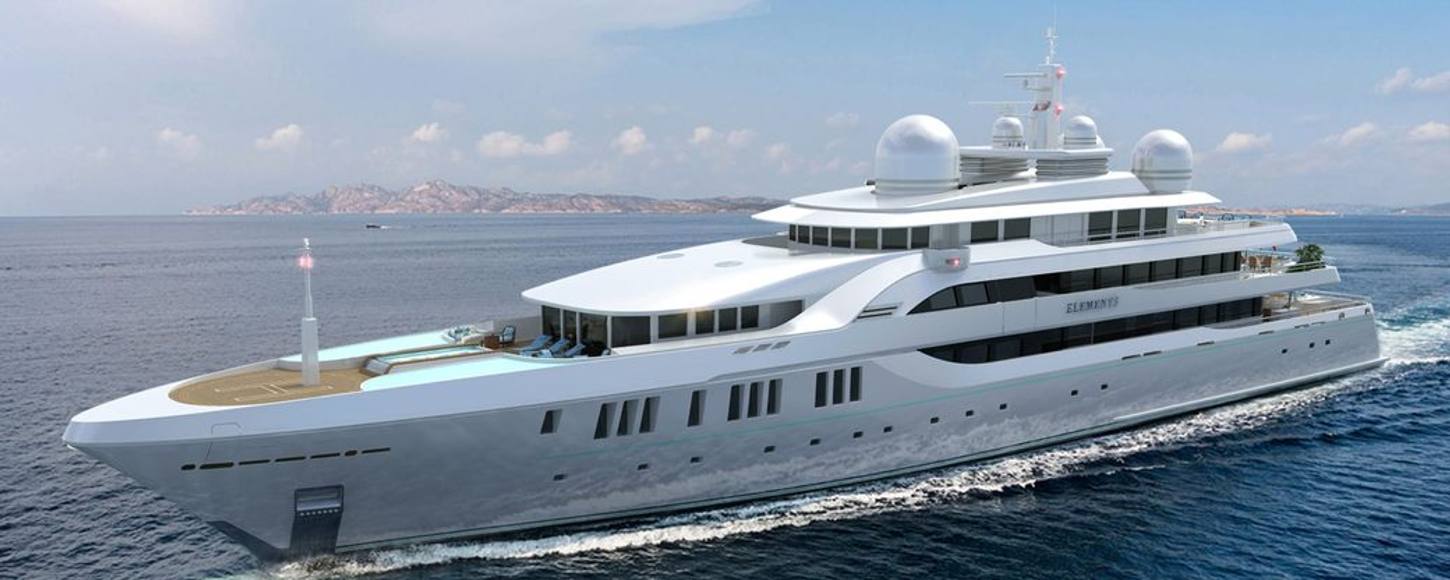
- Yacht Charter Fleet
- Luxury Yacht Charter Advice
Understanding the 12-Guest Rule for Yacht Charters
Maritime regulations pose limits on guest numbers
- Share this on Facebook
- Share this on X
- Share via Email
By Editorial Team 24 January 2023
"Why is there a 12-guest limit on the yacht I want to rent?" is a commonly-asked question among charterers considering booking a crewed yacht vacation for the first time. To help explain why the majority of charter yachts, regardless of size, have a 12-guest limit, we've outlined the reasons and some points to consider before booking a yacht vacation.
In this article:
12-guest limit on yacht charters explained
What is the reg yacht code, what does this mean for yacht charters, can i secure a yacht charter for more than 12 guests, tandem yacht charters, need more yacht charter advice.
In general, the number of guests allowed on board a charter yacht depends on the license it holds to carry passengers for yacht charters. This can be anything from 4 up to a maximum of 12 guests, usually commensurate with the size of the yacht.
If you are looking to entertain extended family, host your huge social circle for the vacation of a lifetime, or a mix of the two, you might be wondering why most charter yachts do not allow a higher number of guests, regardless of their size. Even for seasoned charterers, the limits can still be a point of contention.
This is largely to do with international maritime regulations, as yachts that carry more than 12 guests are legally considered to be passenger ships, which means they have to meet a different set of criteria to cruise at sea under the Passenger Yacht Code (PYC).
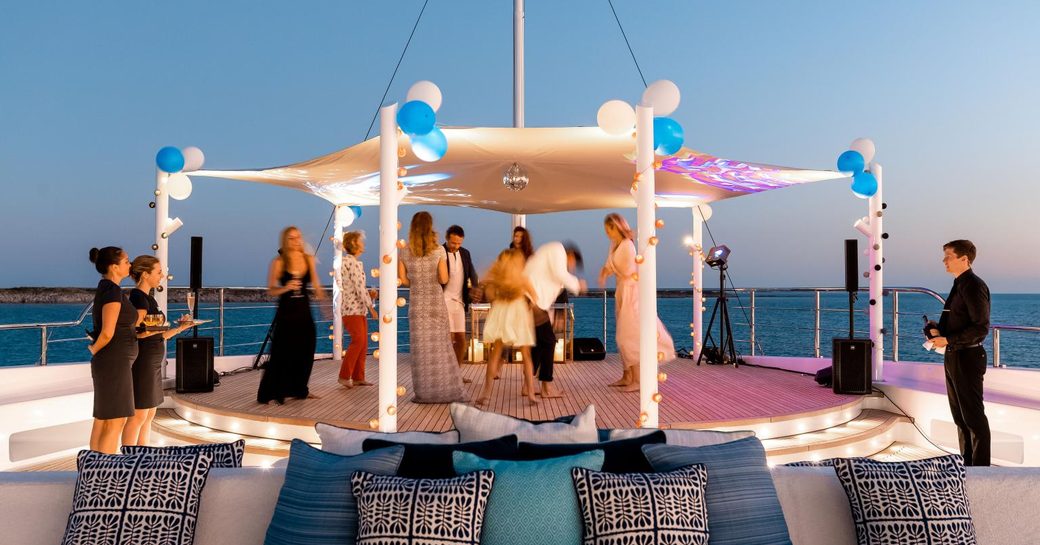
In 2017, the PYC was replaced with the Red Ensign Group (REG) Yacht Code , developed to be more specifically geared towards the superyacht industry.
This code sets out the technical, safety and operational standards for a yacht, including the number of passengers allowed on board. As a result, the code is made up of two parts;
- Part A – (updated version of the Large Yacht Code - LY3) applies to yachts 24 meters and over in load line length, in commercial use for sport or pleasure, do not carry cargo and not more than 12 passengers.
- Part B – (the updated version of the Passenger Yacht Code - PYC) applies to pleasure yachts of any size, in private use or engaged in trade (commercial charter), which carry more than 12 but not more than 36 passengers, and do not carry cargo.
The REG Yacht Code Part B is a superyacht alternative to full compliance with the Safety Of Life At Sea (SOLAS) convention. The latter is a set of rules applicable to most merchant or cruise ships.
The REG criteria for yachts carrying more than 12 passengers sets out strict rules governing design and construction standards, as well as other important safety measures.
Yachts will usually need to undergo rigorous testing, extensive surveying, hire more crew and may even need to be completely refitted. Unsurprisingly, this can be inconvenient, time-consuming and often prohibitively expensive for the owner.
Consequently, many yacht owners decide to keep the maximum number of guests onboard to 12 (plus crew) for chartering.
This means, for example, that an 80-meter yacht with 8 staterooms may well have the ability to sleep 16 guests while in private use, but on a commercial charter is only allowed to sleep 12 guests.
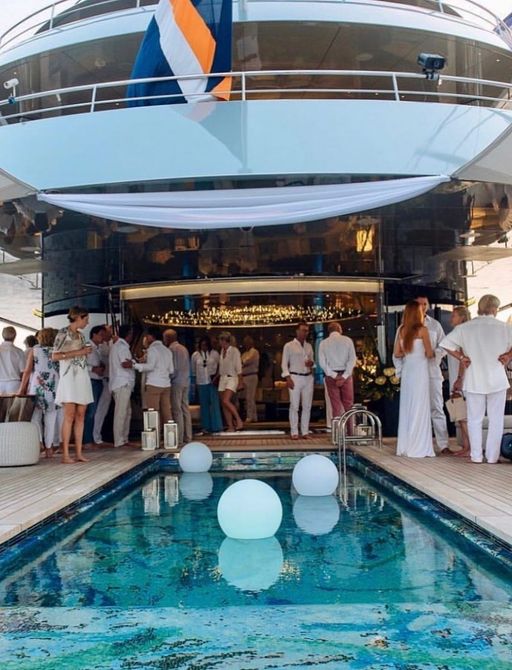
There is a fairly healthy selection of yachts available for charter that can sleep more than 12 guests on board. That said, if you are interested in securing one for your next yacht charter, it would be wise to inform your broker of your guest numbers as far in advance as possible as demand for these yachts can be high.
If you do not secure a luxury yacht rental that accommodates all of your party, tandem yacht charters are a popular alternative.
A tandem charter involves two or more vessels being booked together, and can provide a lot more flexibility. For example, guests may decide to split itineraries between yachts for particular activities (one yacht could take a group sport-fishing, the other for a day's pampering) or divide the yachts up between adults and younger ones (with accompanying staff, if applicable).
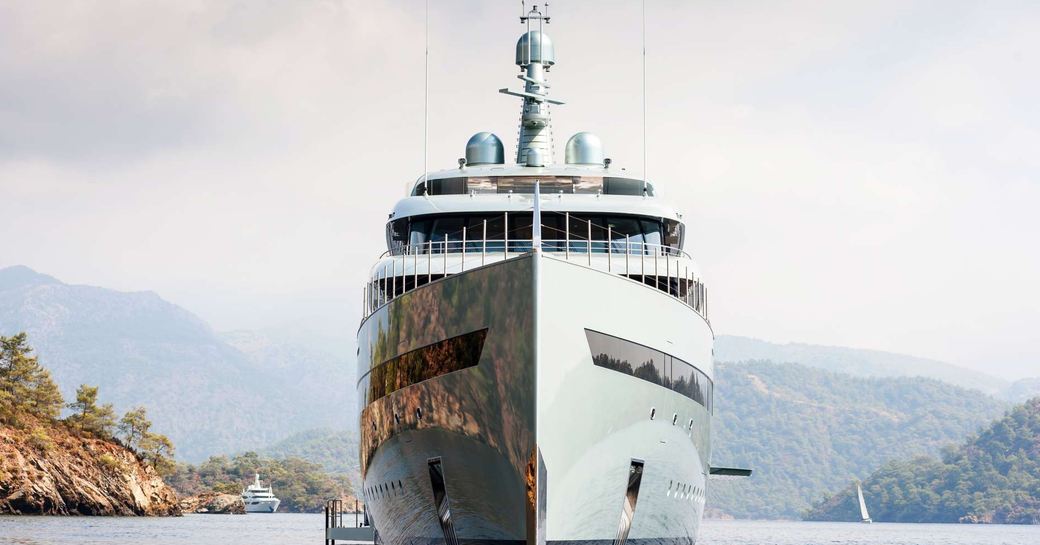
For more advice on booking a luxury yacht charter , please speak with your preferred yacht broker . Whether you are looking for assistance on booking a charter suitable for 12 guests or under, or for a vessel that can cater to a much larger party, a broker will be able to carefully curate a vacation entirely to your needs and requirements.
Take a look at our advice guides for more information on chartering a superyacht, covering everything from charter contracts to yacht vacation packing tips.
Related advice articles

- Share on Linked In
Yacht Reviews
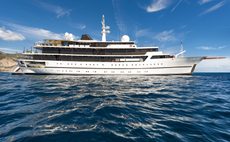
- See All Reviews
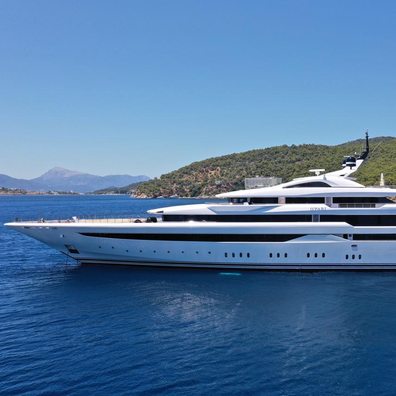
Charter Yacht of the week
Start Planning - Speak with a Charter Expert
Our charter experts will:
- Discuss your vacation plans
- Check availability & shortlist suitable yachts
- Negotiate booking & prepare your itinerary
Enquire now for yacht availability & free consultation.
Featured Luxury Yachts for Charter
This is a small selection of the global luxury yacht charter fleet, with 3565 motor yachts, sail yachts, explorer yachts and catamarans to choose from including superyachts and megayachts, the world is your oyster. Why search for your ideal yacht charter vacation anywhere else?
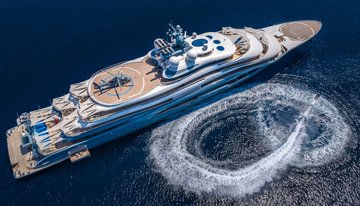
136m | Lurssen
from $4,376,000 p/week ♦︎
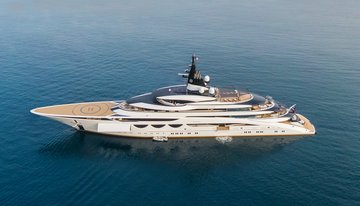
115m | Lurssen
from $2,844,000 p/week ♦︎
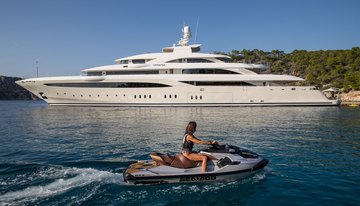
85m | Golden Yachts
from $985,000 p/week ♦︎
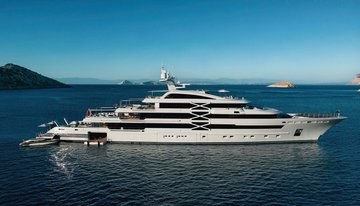
88m | Golden Yachts
from $1,203,000 p/week ♦︎
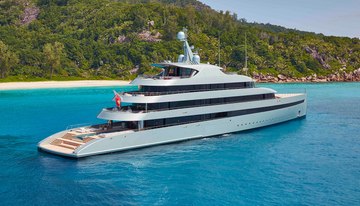
83m | Feadship
from $1,089,000 p/week ♦︎
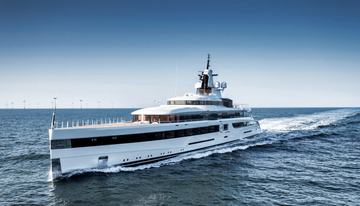
93m | Feadship
from $1,532,000 p/week ♦︎

Maltese Falcon
88m | Perini Navi
from $490,000 p/week
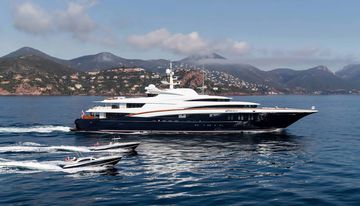
76m | Oceanco
from $860,000 p/week ♦︎
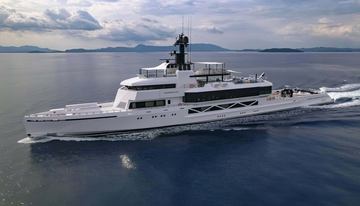
85m | SilverYachts
from $960,000 p/week
As Featured In
The YachtCharterFleet Difference
YachtCharterFleet makes it easy to find the yacht charter vacation that is right for you. We combine thousands of yacht listings with local destination information, sample itineraries and experiences to deliver the world's most comprehensive yacht charter website.
San Francisco
- Like us on Facebook
- Follow us on Twitter
- Follow us on Instagram
- Find us on LinkedIn
- Add My Yacht
- Affiliates & Partners
Popular Destinations & Events
- St Tropez Yacht Charter
- Monaco Yacht Charter
- St Barts Yacht Charter
- Greece Yacht Charter
- Mykonos Yacht Charter
- Caribbean Yacht Charter
Featured Charter Yachts
- Maltese Falcon Yacht Charter
- Wheels Yacht Charter
- Victorious Yacht Charter
- Andrea Yacht Charter
- Titania Yacht Charter
- Ahpo Yacht Charter
Receive our latest offers, trends and stories direct to your inbox.
Please enter a valid e-mail.
Thanks for subscribing.
Search for Yachts, Destinations, Events, News... everything related to Luxury Yachts for Charter.
Yachts in your shortlist

- Paris Le Bourget → Moscow Vnukovo

Private jets from Paris Le Bourget to Moscow Vnukovo | Moscow Vnukovo to Paris Le Bourget
Private flight from Paris Le Bourget to Moscow Vnukovo
The private flight from Paris Le Bourget to Moscow Vnukovo has a distance of about 2451 km and a flying time of about 3 hours and 31 minutes. Given the total distance of the flight and the number of flight hours it is advisable to fly with a medium jet or large jet aircraft. Both airports have a long runways and allow the landing of any aircraft. The flight may require a fuel stop with a light jet, with a medium jet aircraft may not be necessary; with a large jet aircraft a fuel stop is not required.
Some examples of aircraft for the flight Paris Le Bourget - Moscow Vnukovo or Moscow Vnukovo - Paris Le Bourget:
Paris Le Bourget Airport
- International Airport - Large runway
- Airport Website: http://www.aeroportsdeparis.fr/
- Timezone: Europe/Paris
- City: Paris
- Country: France
- Latitude: 48.969398499
- Longitude: 2.441390038
Moscow Vnukovo Airport
- Airport Website: http://www.vnukovo.ru/eng
- Timezone: Europe/Kaliningrad
- City: Moscow
- Country: Russia
- Latitude: 55.591499329
- Longitude: 37.261501312
Routes to other airports
- (59 km) Paris Beauvais Tillé → Moscow Vnukovo
- (212 km) Caen → Moscow Vnukovo
- (213 km) Tours Val De Loire → Moscow Vnukovo
- (257 km) Laval Entrammes → Moscow Vnukovo
- (224 km) Calais Dunkerque → Moscow Vnukovo
- (103 km) Rouen → Moscow Vnukovo
- (101 km) Amiens Glisy → Moscow Vnukovo
- (147 km) Auxerre Branches → Moscow Vnukovo
- (136 km) Troyes Barberey → Moscow Vnukovo
- (28 km) Paris Orly → Moscow Vnukovo
- Paris Le Bourget → Moscow Sheremetyevo (43 km)
- Paris Le Bourget → Moscow Domodedovo (45 km)
- Paris Le Bourget
To enhance your browsing experience, you need to enable Javascript in your browser
Hotels.com Rewards is now One Key™
Apart hotel yantar, choose dates to view prices, photo gallery for apart hotel yantar.

Overview of Apart Hotel Yantar
Property highlights.
- Free parking
- Child-friendly activities
- 24/7 front desk
- Non-smoking
Main amenities
- Daily housekeeping
- Breakfast available
- 24-hour front desk
- Arcade/game room
- Front-desk safe
Feel at home
- Children stay free
- Free self parking
Room options
View all photos for twin room, private bathroom.
Twin Room, Private Bathroom
- 2 Twin Beds
View all photos for Superior Double Room

Superior Double Room
- 1 Queen Bed
View all photos for Triple Room, Private Bathroom
Triple Room, Private Bathroom
- 3 Twin Beds
About the neighborhood
What's nearby.
- Electrostal History and Art Museum - 6 min drive
- Noginsk Museum and Exhibition Center - 10 min drive
- History of Russian Scarfs and Shawls Museum - 19 min drive
- Central Museum of the Air Forces at Monino - 28 min drive
- Yuri Gagarin Cosmonaut Training Center - 41 min drive
Getting around
- Zhukovsky (ZIA) - 69 min drive
- Moscow (DME-Domodedovo Intl.) - 79 min drive
- Sheremetyevo Intl. Airport (SVO) - 84 min drive
- Moscow (VKO-Vnukovo Intl.) - 122 min drive
- Noginsk Station - 16 min drive
- Monino Station - 22 min drive
- Pavlovsky Posad Station - 25 min drive
About this property
At a glance, arriving/leaving.
- Check-in time ends: anytime
- Minimum check-in age: 18
- Check-out time is noon
Restrictions related to your trip
- Check COVID-19 restrictions.
Special check-in instructions
- Front desk staff will greet guests on arrival
Required at check-in
- Credit card, debit card, or cash deposit required for incidental charges
- Government-issued photo ID may be required
- Minimum check-in age is 18
- If you require a visa to enter the country, your property may be able to help with the supporting documents needed to obtain one*
- Russian citizens: Adults (aged 14 and over) must present a valid internal passport at check-in (international Russian passports and driver's licenses are not accepted). Birth certificates must be presented for all Russian children (aged under 14) at check-in. If a Russian relative or legal guardian (rather than a parent) is traveling in Russia with a child under 14, that relative or legal guardian is also required to present documentation certifying authority to accompany child at check-in. Non-Russian citizens: Adults and children must present a valid passport, visa, and migration card at check-in.
- One child (5 years old and younger) stays free when occupying the parent or guardian's room, using existing bedding
- No cribs (infant beds)
- Pets not allowed
- Free WiFi in public areas
- Free WiFi in rooms
- Free onsite self parking
- Wheelchair-accessible parking on site
Other information
- Smoke-free property
Property amenities
Food and drink.
- Continental breakfast (surcharge) each morning 7:00 AM–11:00 AM
Traveling with children
- Children stay free (see details)
- Children's games
- Safe-deposit box at front desk
Accessibility
- Braille/raised signage
- Wheelchair-accessible parking
Room amenities
Be entertained.
- LCD television
- Satellite TV channels
Home comfort
- Shower only
- Free toiletries
- Hair dryer (on request)
Stay connected
Fees & policies, optional extras.
- Continental breakfast is offered for an extra charge of approximately RUB 200 per person
Also known as
Frequently asked questions, no reviews yet, most popular destinations.

VIDEO
COMMENTS
Among these, yachts have emerged as the epitome of opulence and intimacy with the seas. To truly appreciate the yacht's position in the maritime ecosystem, one must delve into the intricate differences between private and charter yachts. In the vast tapestry of marine vessels, private yachts stand as a testament to personal luxury and bespoke ...
In short, traditional private yacht ownership is expensive, and while it does have a substantial upside, for many it's not a realistic option. With a charter ownership program, you can purchase a new yacht and have the expenses of insurance, dockage, security, maintenance, and cleaning all covered for you. And what's more - the regular ...
Find out if owning a private yacht or chartering one is the perfect choice for your dream vacation. ... Private Yacht Vs. Charter: Which Is Right for You? By Hertha / January 22, 2024 . You may think that renting a private yacht is only for the rich and famous, but think again. When it comes to planning your next luxurious getaway, it's ...
YPI CREW. Jan 21, 2021. 3 min read. A luxury yacht job offers a rewarding career and plenty of perks, whether you work on a private yacht or a charter yacht. However, there are some distinct differences to working as crew on these two types of vessels. In a private yacht job, you will be working on a yacht used only by the owner and their guests.
By Rebecca Taylor Posted on September 16, 2023 Charter, FAQ. A private yacht charter is the same as a private yacht rental or a luxury yacht charter - you rent a yacht (usually for at least a week), that is owned by someone else. You get access to their private yacht crew, all of the amenities and get to work with the captain on the itinerary.
Private Yacht vs Yacht Charter: An Overview. When deciding between chartering a private yacht and hiring a crewed yacht, there are several factors that must be taken into account. In this overview, we'll explore the main differences between these options and delve into the key considerations for each.
There's no doubt that often, a charter will be a more stressful environment, especially for younger crew members. "The culture on a charter yacht is intense", adds LH's Emily Coates, a former first officer. "Tasks are done faster, stress levels are higher, crew celebrations after the charter are louder and the lows are lower.
Both private and charter yachts can be challenging and demanding places to work, whether you are cut out to work on either is determined by your attitude, commitment and approach to the exclusive superyacht industry. They both have their great benefits of travel, high earnings, professional development and diverse networking, all the while ...
This year in the Caribbean, Sheila Ruffin of Soca Yacht Charters has launched a "Stranger on the Seas" package. Prices start at around $6,000 per person—all-inclusive—on catamarans between ...
To get a better idea on how much it costs to charter a yacht, and get your "all inclusive" price, we recommend adding 50 - 55% of the base rate. In this example, a base price of $100,000 a week yacht charter will end up costing you around $150,000 total. 2000 NOBISKRUG 92.3544m. TATOOSH. €950,000 EUR.
A motor or sailing vessel in commercial use (i.e. charter) for sport and pleasure, carrying no cargo and not more than 12 passengers. Private yacht. ... While introducing a stricter set of rules and regulations compared to private yachts, commercial registration offers yacht owners the possibility of making a profit from the chartering activity ...
Cruise Ship vs. Private Yacht Charter Book a cruise ship or charter your own private crewed yacht… two very different vacations. A Vacation on Your Own Private Crewed Yacht Visit remote beaches and islands that cruise ships and hotel guests never see. Wake up in a different pristine bay each morning.
Private vs. Charter Crew Private yacht owners often want to acknowledge crew financially for exceptional service, but this can be a slippery slope. "A lot of owners ask me for advice on how that works, especially if they are new," says Michael Reardon, president and owner of Reardon Yacht Consulting .
The owner maintains primary possession of the yacht. One contract agreement. To legally operate crewed charters in US waters, the yacht must be; US flagged, and. Hold a coastwise endorsement. To be eligible for a Coastwise endorsement, the yacht must either have been: Built in the US, or if foreign built; Must be granted with a MURAD Waiver.
A private yacht has a license to sleep up to 12 guests, but at the smaller end 8 guests is more common, so let's start with that to keep the comparisons realistic. If each person is spending $6,000 on a cruise ship vacation, you and your partner could raise $ 48,000 for a yacht charter by pooling your money together with just three other couples.
When it comes to chartering a yacht, prices can vary widely depending on the type of yacht, its size, and the duration of the charter. Here is a rough guide to the charter prices for some of the most popular types of yachts: Motor Yacht: $20,000 ~ $500,000 per week. Sailing Yachts: $10,000 ~$250,000 per week.
Luxury: Private yacht charters often offer a higher level of luxury than shared charters. You can expect to find more luxurious amenities and better quality service on a private yacht charter. Safety: A private yacht charter allows you to have a smaller group of people on board, which can make the trip safer and more enjoyable.
Consequently, many yacht owners decide to keep the maximum number of guests onboard to 12 (plus crew) for chartering. This means, for example, that an 80-meter yacht with 8 staterooms may well have the ability to sleep 16 guests while in private use, but on a commercial charter is only allowed to sleep 12 guests.
Private yachts vs charter yachts. Private Super Yachts. Some of my favourite yachts to work on have been private yachts. Having that personal connection with the owners can really turn your job into an awesome one. Working as a chef certainly has it's perks. It is not unheard of for yacht owners to like their chef so much, that they are ...
See other industries within the Transportation and Warehousing sector: Charter Bus Industry , ... Dun & Bradstreet collects private company financials for more than 23 million companies worldwide. Find out more. Get a D&B credit report on this company .
The private flight from Paris Le Bourget to Moscow Vnukovo has a distance of about 2451 km and a flying time of about 3 hours and 31 minutes. Given the total distance of the flight and the number of flight hours it is advisable to fly with a medium jet or large jet aircraft.
The Moscow Metro system is full of art, but there are hundreds of stations. Eliminate the risk of getting lost in the vast network, or missing the most important stations. On this handy private tour you'll be taken to the most interesting and impressive art and architectural examples, and learn all about their history and cultural significance from your local guide.
View deals for Apart Hotel Yantar, including fully refundable rates with free cancellation. Near Electrostal History and Art Museum. WiFi and parking are free, and this hotel also features breakfast. All rooms have LCD TVs and free toiletries.